Michael Pierre Vlatkovich
TROMBONE / COMPOSITIONS
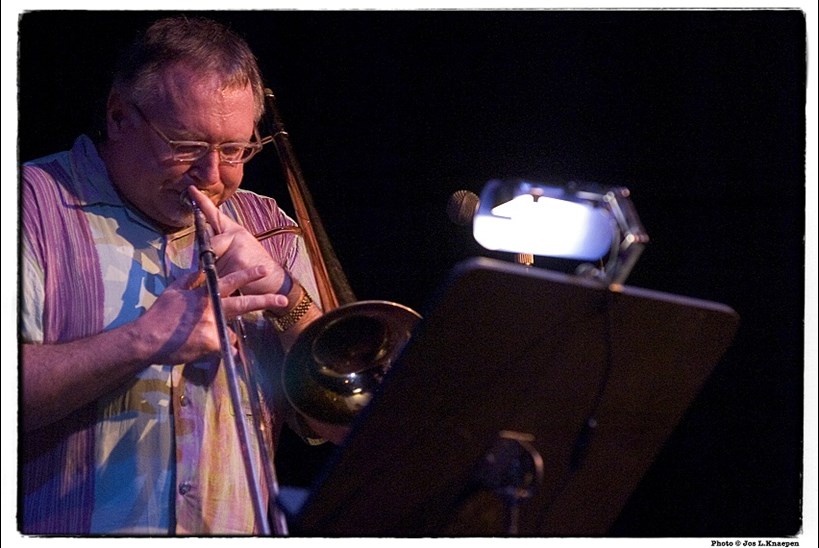
BIOGRAPHY
Michael Vlatkovich (° May 4th, 1951 in St. Louis, Missouri), trombonist, composer, and arranger, is one of the leading talents among Los Angeles improvisational players. Located on the West Coast since 1973, he is an emotionally charged performer, comfortable in a variety of jazz and world music styles. He has performed extensively in the United States, Canada, and Europe. His improvisational free music expresses raw power and beauty in a minimally structured format.
Born in St. Louis, Missouri, Michael began studying music with the school band in the third grade. He distinguished himself in high school and was awarded a music scholarship to attend the St. Louis Institute of Music. Prior to his education at the Institute, he took part in an intensive six week workshop with internationally acclaimed saxophonist Oliver Nelson and guest soloists, Thad Jones, Mel Lewis, Roland Hanna, Ron Carter, and Phil Woods. Among his fellow students were Hamiett Bluett, Joe Bowie, Julius Hemphill, and Oliver Lake.
In addition to leading his own diverse imaginative ensembles, Vlatkovich has performed with a wide array of singers and instrumentalists including Peggy Lee, Brian Setzer, Bryan Adams, Bobby Bradford, Gerry Hemingway, Rob Blakeslee, Rich Halley, among many others.
The trombonist has also performed on sound tracks for a variety of television and film projects including The Mask, Jingle All The Way, and the critically acclaimed John Cassavette's film the Tempest.
In 1981, the composer formed Thankyou Records in order to document the truly unique forward thinking musical concepts and ideas of both himself and his music collaborators. These recordings have received critical acclaim in music publications and periodicals throughout the United States and Europe. Many of them have been selected for the lists of ten best jazz recordings.
Most recently the trombonist has been performing with his own ensembles, and co-leading Transvalue with poet Charles Britt. Vlatkovich is also a regular member with the Vinny Golia Large Ensemble, Rob Blakeslee Quartet, the Rich Halley 4, Bobby Bradford Motet, and LA Mambo All Star Orchestra.
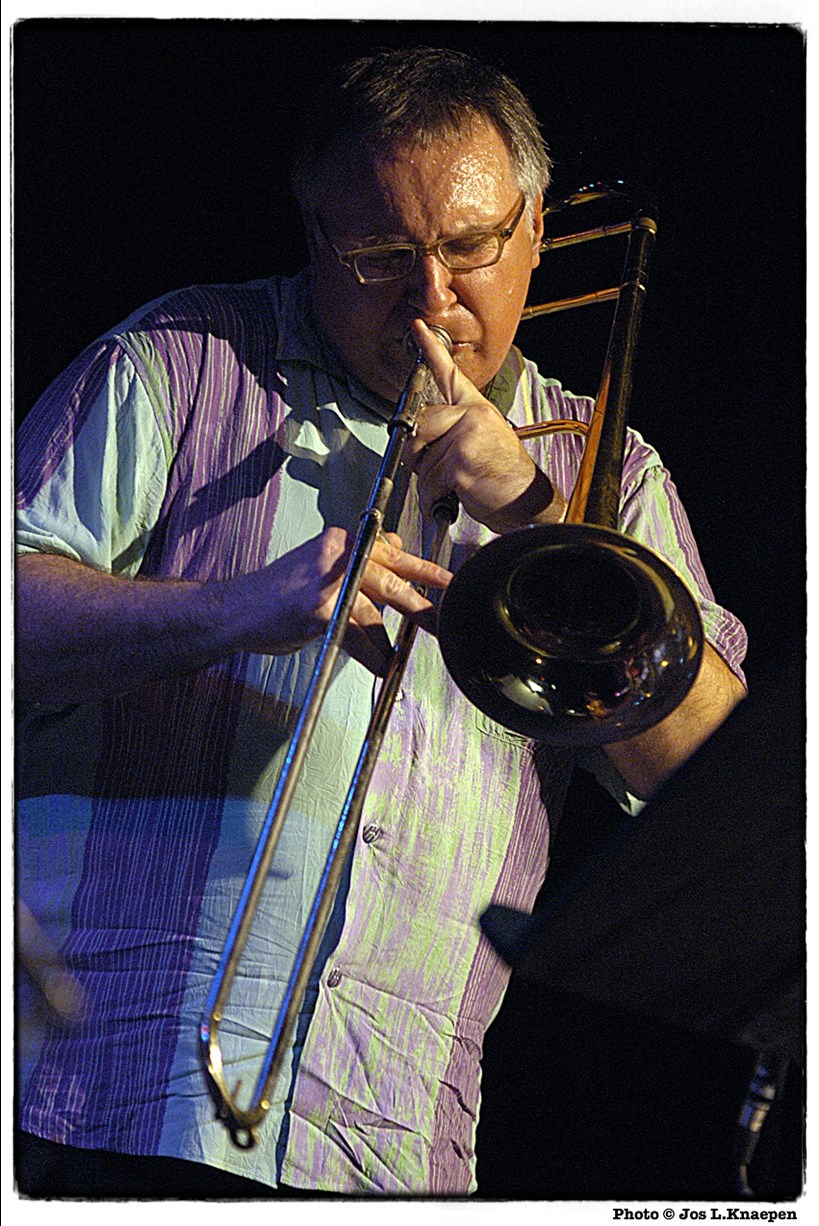
The magazine JAZZIZ (USA) has called Vlatkovich, "... one of the most extraordinary improvising trombonists in this country as well as overseas. Also a gifted composer and arranger, Vlatkovich is one of the leading talents among Los Angeles improvisational players. Working from the Left Coast since 1973, he is well known for tireless touring, bringing his music all over the United States, Canada, and Europe. A daring and emotionally charged performer, Vlatkovich takes delight in blending a broad variety of jazz and world music styles into his own brand of engaging and unpredictable music. His approach manages to express a raw power and beauty within a minimally structured format that allows extensive group improvisations to lead the way."
Taken & Transcribed by Ludwig van Trikt
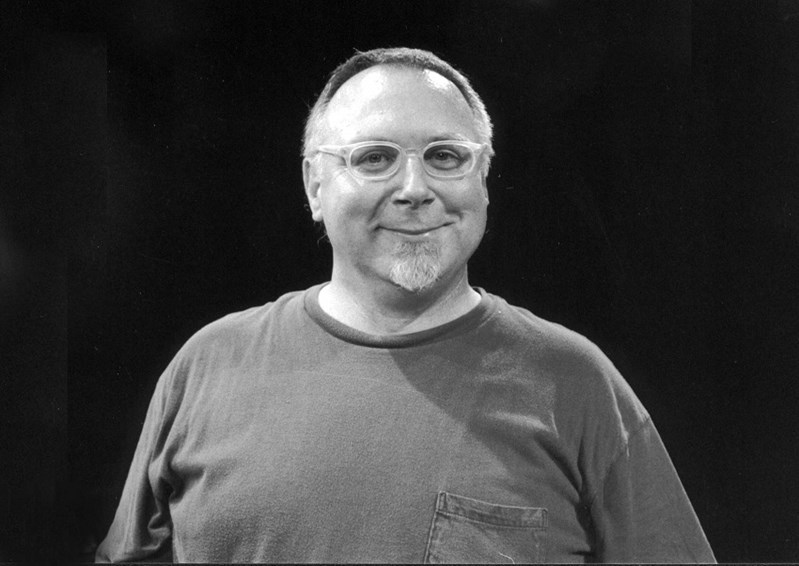
© Jacky Lepage
I have long thought of you as being from the West Coast but you actually come from the Midwest.
St. Louis, Missouri, on May 4, 1951. After all these years, St. Louis is one of the cities in which I’ve spent the least overall time, 18 years. Los Angeles is the location in which I’ve spent the most time and the West Coast is where I mostly perform and record. Not much attention is paid to the West Coast improvising musicians, particularly the sort of music I choose to record and perform.
Were you a musical prodigy?
What a wild question! No, absolutely not. I consider myself to be a slow, methodical learner. Observation has always played a big part in my development. I have always been good at shutting up and listening. Creativity is certainly quite important, however; knowing how and when to use it is equally important. To have a large palette (ideas) from which to draw the appropriate strategy is also key to success. I’ve always loved creativity and my game has always been the expansion of ideas. After being on the planet for a while, I’ve learned how best to be me. That’s always been my goal. No one does me better than me. Finding your voice. Finding your method for expressing ideas/concepts of others that have touched your life. Exploring the possibilities and then making them your own. All of it never has to stop. All of it keeps me going.
I had read in your Bio that you “distinguished” yourself while in high school thus receiving a musical scholarship to attend the St. Louis Institute Of Music.
After high school I did get a scholarship to St. Louis Institute of Music. At that point in the school’s history it was a very, very small school. For many things a small school is desirable, but I guess the main negative was the fact that there were no ensembles of any sort. Not enough students playing instruments and no one creative enough to use the instrumentalists that were there. All the classes dealt with aspects of music such as dictation, history, form, harmony, etc.... All in all it was a good time for me.
You had some early contact with some of BAG (St. Louis Black Artists Group).
In 1969 I was fortunate to attend a six week clinic with Oliver Nelson at Washington University in St. Louis. Prior to this, I had very little contact or experience with Jazz. At the clinic, I played in both of the big bands. I guess you would say an A and B band. I was not involved in any of theclasses. The A band included Julius Hemphill, Oliver Lake, Hamiet Bluiett, and Joe Bowie. We would play a concert every Saturday with guest artists such as Phil Woods, Ron Carter, Thad Jones, Mel Lewis, and Roland Hanna. We, of course, played a lot of Oliver’s arrangements as well as those of the guests. The big band would play the first half of the program and Oliver would play the second half with a rhythm section. At that time I also had the opportunity to play in an orchestral concert featuring soloist Phil Woods playing an Oliver Nelson composition. It was all a tremendous learning experience. I knew so little then and to be thrust in this environment was incredible. I really loved his dense, tight harmonies. I loved playing his music. It was a long time
ago now, but I do have very fond memories of that time.
Did you ever have any subsequent dealings with what would become BAG?
St. Louis, as with many cities in the United States, was segregated. As I said, I had little Jazz experience prior to this workshop and absolutely no contact with the Black Jazz players in St. Louis. Many ugly things were going on in the ‘60s. I was just a stupid White kid trying to figure out how to play music. At that point, I had no idea what questions to even ask, much less have the wherewithal to ask them. I had no clue.
How did you get from point A to point B?
Rather than an autobiography here is my answer. I have always had much support and encouragement along the way, both in terms of instruction, advice, participation, etc. Nothing will ever happen unless you are able to find people that will say yes to that which you wish to achieve. Fortunately, I have found those people, mostly with regard to performing in my ensembles. I started putting groups together to read through my music early on. I suppose it was late high school. I still record and perform some of that music. Two examples would be “Animal Circus of Snow” circa 1970 and “All of You None of Us Know” circa 1973. The former appears on Parlor Games and the latter on Across 36 Continents. I have always tended to write music for an ensemble with whom I was currently rehearsing and performing. The ensemble in the early ‘70s consisted of trumpet, trombone, two woodwinds, vibes, guitar, bass, drums, and percussion. Someday maybe I’ll revisit some of that music. The music from that time is rather programmatic.
As I said in an earlier question, observation has been vital. You can learn quite a bit from participating in another’s rehearsal and I have. I used to play in quite a few rehearsal bands in Los Angeles. Often I find younger musicians forget the obvious: the musicians at your rehearsal
are doing you a favor. Treat them well and in a professional way. You need them! It’s amazing to me how often that doesn’t happen these days.
After attending North Texas State for a short time I went to Los Angeles in 1973. As I said, I played in some rehearsal bands and performed and rehearsed my own group. At that time, I played somewhat regularly at The Cellar Theater. Drummer Les Demerle had the space. He lived there and performed with his band there as well.
Emmett Chapman was just beginning with The Stick. He would also perform. I was also performing trust fund concerts and with a ragtime orchestra, Crystal Palace. It was a wonderful band. Ian Whitcomb (Stomp Off Records) was the singer.
Slowly, I continued to experiment with the balance between written and improvised music. Also the question of the specific role of each member of the ensemble is very important to me. These two concepts have been and will continue to be my focus.
Would you still say that, in some form or fashion, Oliver Nelson is to thank for your being an improviser?
Without a doubt, the major influence of Oliver Nelson on me was his thoughts on voicing, specifically five and six part harmonization. It is not necessary to double a chord tone. Actually, I feel it to be more preferable, unless there is a specific reason not to do so. That concept was truly eye-opening for me. I will always use it.
Prior to those six weeks, my only opportunity to play in an ensemble with semiprofessional/professional musicians was a community orchestra. During that time we played the Overture to Candide composed by Leonard Bernstein. It was also a wonderful experience. Sitting in that orchestra and hearing those sounds, textures, counterpoint, etc. ... A similar experience occurred in the Oliver Nelson band. Hearing those solos voicings, phrasing, etc. It was very informative and a great introduction into that musical world. In retrospect, I wish I had taken more advantage of the opportunities. Youth is wasted on the young.
You developed outré interest at a very young age. What shaped your taste—was radio a factor?
Early on I did not listen to the radio. All the music I heard was through friends’ suggestions. It was a long process, slowly checking things out. There just aren’t many radio shows playing my interests in improvised music. There were two shows in Los Angeles on KPFK I liked, that played music and had interviews with musicians. This was the late ‘70s/early ‘80s. Neither of those shows exist now.
I have never owned a turntable. I always was in a living situation with someone who did. I would buy new and used records or make tape recordings. My priorities were such that I just never could afford to spend money on audio equipment and records, CDs, etc. I spent money on my own records and CDs.
As far as my direction in music, I would have to say it has always been conceptually driven. Some sensorial experience I found gratifying would inspire me to attempt to create a similar experience through music. For the last twenty years or so, I’ve chosen to make the subject/title of the music relate primarily by means of symbols. Transposing the symbols used to create music over those symbols used to create my subject of interest. As a result, there is a completely different relationship between the title/subject and the music. The concepts now with which I deal are primarily compositionally driven. The symbols of the music are predetermined by the above process. I must say that there can be quite a bit of processing when creating a composition. However, I have never wished the compositional process to interfere with the outcome and I often forget which special compositional process I used. For me it’s a game.
Since you pretty much came out of the gate playing so-called avantgarde gigs, I wondered if you had bread & butter gigs to survive?
A large percentage of my work has been playing with Latin bands, music copying, and arranging. I did that for many years, sometimes successfully other times not. Capitalism and I have never been close. As a result, without friends, my musical world would at times be rather bleak. It’s difficult, particularly in Los Angeles, where the lowest common denominator means everything to have a product, the least common denominator which means nothing. It’s a subject I would rather not talk about.
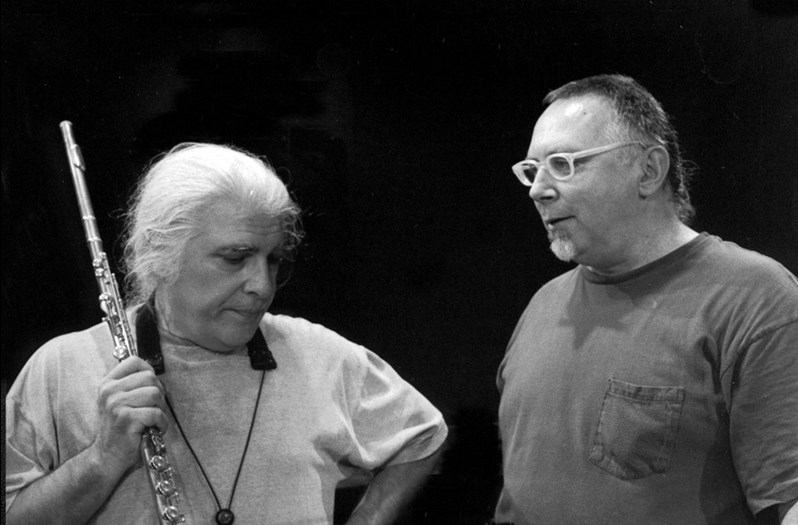
with Vinny Golia, Jazz'halo Music Days 09/2001 © Jacky Lepage
Judging from your current close associations (e.g., Vinny Golia, Jeff Kaiser), it would seem that at some point you discovered a fraternity of likeminded improvisers?
I would have to say that’s essential. There needs to be a common language. Leading an ensemble that utilizes improvisation as an important component needs musicians with a language that is compatible with yours. It is also important to know their capabilities and to use and accentuate those assets favorably. It is quite different if you are a sideman. The sideman needs to function as the composer wishes. The sideman is a member of the ensemble making choicesbased on the music, not on what makes him/her sound good. You can often find a situation: nice solo / wrong tune. All of the musicians with whom I play use in their ensembles musicians that know what is being asked of them. The written music directs them in a certain direction and they develop those ideas in a myriad of ways. Sometimes the developmental section is discussed, sometimes not. It is completely wrong to think that a member of the ensemble can choose to do whatever they wish. There are choices being made by every member all the time. All of the choices have consequences. I often use the analogy of a conversation about grapefruit. One involved in that conversation would not be likely to interject brake pads. It’s the same with music. My Quartet (David Mott, baritone sax; Jonathan Golove, cello; and Chris Garcia, drums) is a perfect case in point. Each of the members is a composer and we all have a common language that we utilize when performing. We all understand how to make a musical event happen and we each function in the ensemble in a specific role when needed to help encourage the development of that musical event. I chose the instrumentation of the Quartet not only because of the individuals but also because of the instruments they play. The instrument one plays colors their interpretation of musical ideas and I love to exploit those ideas in my music. A success for me is when you can blur the lines between the written and the improvised.
I met Vinny in 1982. He asked me to play in the first Large Ensemble concert at UCLA. It was a very small group compared to now. Many in the ensemble I had never met. It was the beginning of my involvement with some truly marvelous, creative musicians.
In 1978, after being in New York City for six months, I went back to Los Angeles with a clearer picture of my musical focus. I was rehearsing several instrumentations and ultimately found the group that recorded my first record (Thank You Records), which came out in 1982. It was a few months prior to the Large Ensemble concert.
As well as playing in the Large Ensemble, Vinny was also participating in my ensembles. My Parlor Games CD, recorded in 1982, has a track with Vinny. It was the first of many performances he played with me. It has been a very rewarding relationship over these 25 years. During the ‘80s the Large Ensemble, because of its size, played much more than now. We were younger and there was a lot of energy and enthusiasm. The musicians in this scene have always been very supportive of one another. We often organized concert series for all of us to perform. Los Angeles can be a difficult place for this sort of music, but really, I would have to say everywhere is difficult.
Currently I perform with Bobby Bradford’s Motet, and Bill Roper and I have a duo project I love doing. Both of them I met in the Large Ensemble. Rob Blakeslee is another I met playing in the Large Ensemble. I have some wonderful live/studio (1992) recordings with Rob, Vinny, Bill Plake, Anders Swanson, Chris Garcia, sometimes Bill Roper, and myself. That particular group played quite a bit in the early ‘90s. Various forms of that ensemble toured the United States in ‘92, ‘93, and ‘94. It was amazing!
I would say that the scene in Los Angeles is very slow right now. There are many musicians with whom I would like to perform, however, there’s just nothing going on. It’s unfortunate, but it does take energy and enthusiasm to keep a concert series going. And did I mention money?
What has been your experience with your own label?
It was a matter of doing what I want to do and figuring out how to do it. Prior to the release of my first record, the music I was doing was more accessible. I was collaborating with my wife [Devorah Vlatkovich] at the time (1975). She was an extremely talented composer, pianist, and vocalist. I was arranging her material and we were performing it with a group. We also had composed a longer work entitled “Bird Book.” It was a story another friend and I had written. My wife and I set it to music. We recorded that composition along with others and did try —to some degree—to shop it, but there was little interest. I suppose I realized at that point that unless (and until) money can be made from your project, no one cares. It was at this time (1978) that I really wished to explore the relationship between composed and improvised music. Up until that point I was employing the traditional methods of arranging/orchestrating. So I began writing essentially two-part compositions which were to be played by any combination of instruments. I explored many instrumental combinations and began to find individuals that worked well in that format. For me, the individual was more important than the instrument he/she played. I found a group that I felt worked well together and we recorded and did a limited amount of performing. I was able to re-create with this ensemble, through my music, emotions other composers had created in me. It was a great time and experience.
My first record was recorded around 1980 and I finally got the money together to put it out in 1982. Although it did receive extremely favorable reviews, no one will ever be able to convince me that anyone other than myself would have put it out. Not long after that record came out we recorded again, which ultimately would become Parlor Games. Because I waited so long to put it out, it became a CD. I added additional material, also recorded around that time, to fill it out, being that the record length is 45 minutes and the CD 60 minutes.
My second record, The One That Never Stayed (Thank You Records 1983), was, I felt, the best project I had done because I had achieved both the balance between written and improvised music I was striving to accomplish and the blurring of the roles of the instruments I chose. The execution of those roles came off beautifully on this record. I thought this record was extremely successful. Unfortunately, I had little money to promote it and I felt it was often times completely misunderstood.
My third release was a duet record. I thought that the music I had been writing should be performed by the minimum number necessary. There are some overdubs on a few of the tracks, but I wanted to keep it simple particularly because the second record had been very complicated.
Now enters Chuck Britt and the formation of Transvalue. He is a poet/artist and we began collaborating around 1980. Originally the group consisted of tuba, trombone, drums, and poet. We performed many occasions with that configuration. When we started recording, we expanded the group and David Crigger became an integral component in both the recording process and production. Transvalue released two records and, at that point, Thank You Records went into hibernation. I had no money and the CD thing was beginning to really take off.
Finally, in the late ‘90s I was able to resume documenting the music I was composing/performing. Much of it is still to be recorded; many recordings I have done are still [waiting] to be released. The current situation for me is very reminiscent of the transitional period from record to CD I experienced in the ‘80s. Is it worth putting out any more CDs?
I deliberately and rarely discuss/explain the project and its goals because I wish to encourage responses that are free of my own thoughts. It’s always curious.
Are you at the breakeven point with the label or is that a consideration for you?
I’m nowhere close. I lose money on most everything I do regarding this sort of music. You seem to forget that very few people care about this music. Just try to book a tour in this country. You’ll find out exactly how excited the presenters are to talk with you. Every summer you’ll see advertised “Jazz Festivals.” There are many, but few ever have a substantial percentage of even mainstream Jazz. They have acts that are not Jazz but R&B, Soul, Funk, etc. Since I’m talking about the West Coast, the Playboy Jazz Festival comes to mind, which has never considered John Carter, Horace Tapscott, or Bobby Bradford. Tower of Power, and Earth, Wind and Fire are not Jazz groups. Why are they performing at a Jazz Festival? I hope it’s not necessary to answer that question.
I know it’s difficult in a capitalist society to understand why anyone would spend their own money to finance various recordings, tours, etc. It’s really stupid, irrational, crazy, foolish… the list goes on and on. That’s what I do. Why do I do it? Simply put, because that’s what I do and need and wish to do. I have never done this music with the idea of anyone liking it. I wish to be creative and I wish to follow my own creative journey. Even if I wished to please an audience, what would you suggest? It’s ridiculous to think in those terms and be creative. It’s impossible to please everyone all the time. Do Smooth Jazz or Pop? Those folks are looking for some financial reward. They are the ones that commerce feels have a chance to make money. They get airplay and advertising. This society backs exclusively those that will make money. You don’t find financial institutions and Wall Street backing/supporting companies that break even. They don’t even like to back companies that make a 10% profit. They want winners and they do not care how they win, only that they win. I’m as far from that scenario as you can get. I don’t get reviewed in the higher profile magazines because none of those magazines care much about the West Coast. They know nothing about what goes on and they know very little if anything about the musicians. Finally, I’m not willing to pay for ad space to get a review or an infomercial or both.
This society is truly two-faced when it encourages an individual to be his own man and then penalizes the ones that do exactly that. You’ll notice that all professions, including those that are music related, have an unwritten code/rule book to be followed and those that stray are considered inferior, losers, people to be excluded; people that should be feared. It’s rather sick and most importantly sad when a society is incapable of making judgments. Society is told who to like. Society is told what to buy. Society is incapable of making decisions about which music or art or car it should embrace. The professionals know what’s best. It’s amazing how many believe this bullshit. It’s more amazing that you hear supposed professionals making absurd statements such as, “No one is experimenting. No one is trying to expand the improvisational tradition.” Please tell me again the date? Twenty-first century?
When I listen I hear a very open-ended style of composition which lends itself to some extended unselfish improvisation, as on Alivebuquerque (pfMentum Records).
My goal with these compositions, as with all my compositions, is to give the musicians a structure/framework on which to develop more completely their vision at that moment. Sometimes that concept is very precise and other times it’s intentionally vague. In the smaller ensembles, the contribution of each player usually has a more profound effect simply because all are often needed to make the musical idea more complete.
The improvised portions of the music are always based on the composed music. How that is achieved is sometimes more predictable at times than other [times]. The familiarity of the music, and, more importantly, of the musicians, makes the improvising an extension of the written composition utilizing fragments as backgrounds, ostinatos, etc. We are re-orchestrating the themes each time we play. If you were to listen to either “Blue Fragments” or “Every Second...” on my duet CD with Bill Roper and then listen to the same compositions with the Quartet, you might notice the similarities and the differences. There is always a give and take, in these two examples, regardless of whether the group size is two or four. The concept by and large stays the same. The execution changes, depending on the players involved. I would also have to say that specific players make a big difference. On Alivebuquerque I specifically picked those musicians (Chris Garcia, d; Jon Golove, cel; David Mott; sax) not only for the instruments they play, but also because of who they are.
Several years ago I spoke with the late AEC trumpeter, Lester Bowie, and AEC drummer, Don Moye. Both of them said that their lives were examples that musicians can make money playing avantgarde Jazz (improvised music).
I suppose if they said they are making it, I’m not going to say otherwise. I saw them in ‘79 on three consecutive nights at the Village Gate. I don’t remember the audience being terribly large. I saw both of them again about four years ago with Brass Fantasy in Los Angeles. That was well attended, at least the night I was there.
Here is an excerpt from the obituary of Paul Rutherford. It appeared in the Guardian, written by Richard Williams.
“The last years were difficult. Apart from occasional appearances at the Red Rose and the Vortex in London, there were virtually no playing opportunities in Britain. To complicate the business of existing, his beliefs had prevented him from investing in home ownership and had cost him at least one of his three long-term relationships with women. Eventually he was forced to take a part-time job as a doorman at a working man’s club, while health problems arising from a lifelong fondness for beer resulted in two major collapses.”
I would have to consider Paul’s music to be more difficult than mine for the listener. However, you know, if there isn’t a snare on two and four, it isn’t music for many. My experiences, whether as leader or sideman, have been less than desirable. The music, at best, is misunderstood.
Is it because of the difficult climate for improvised music in LA that you have done film projects including The Mask, Jingle All The Way, and John Cassavettes’ The Tempest?
There are not many musicians anywhere that can solely make a living doing this sort of music. Most teach and acquire grants to make it happen. There are probably 5,000 hardcore fans of this music in the world. Very few people care about this music and many hate this music, particularly musicians and educators. The lack of exposure certainly doesn’t help, but music for many functions as little more than wallpaper. I will say, however, sometimes I have found that individuals at my performances who just freely observe without preconceived ideas of what should occur, enjoy themselves. A performance for the uninitiated is much better than a recording because they can observe how, who, and where the sound is originating and get a sense of the energy involved in producing those musical landscapes. Recordings make those observations more difficult, if not impossible. There are many different ways to enjoy and take in this music. You do not have to have perfect pitch, music theory background, and/or a vast knowledge of the instrumental techniques used in the production of the music. I think to some extent those involved in some way with the music intimidate those not knowledgeable, causing them to feel inadequate to appreciate a concert without having immersed their lives in a musical career themselves. We love. We hate. We live. We die. Most if not all, can relate to those themes. Music/Art is often about those themes.
Would you say that most of the possibilities for the acoustic trombone have been exhausted?
There are an infinite number of possibilities. Limits are more often than not imposed by the individual. These days usually it is the arrangement/use of concepts as opposed to creating new concepts which regularly appear in musical productions. In a world of so much excess it’s not easy, even when you’re vigilantly looking, to find those special abilities unique to an individual. Society often is interested and often focuses only on certain aspects of a performance that are easy to discern, such as speed and technique.
Making music should be the ultimate goal. No matter what you can do, it has to be appropriate for the occasion. Some are very good at incorporating their thing into the music and come out the other side with a musical product of quality. Those are definitely creative and sometimes innovative folks. That will never cease to exist. Those musicians early on are drawn to a particular path. They have a propensity for that path. A combination of both natural ability and luck are needed, then nurtured. All the ingredients are in place and—presto!—you get a creative musician. I don’t see that stopping unless the process stops.
The danger occurs when exclusivity of certain techniques or concepts are employed. The performance can become static because the listener is not surprised; there is no anticipation of events. Variety is important to me. I much prefer to be inclusive and use it all in non-traditional ways. Keep them guessing.
July 6, 2007 - Los Angeles, CA
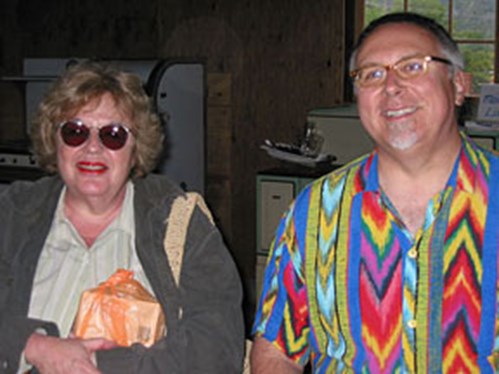
© Michael Vlatkovich
MICHAEL VLATKOVICH / DOROTHEA GROSSMAN PROJECT
Dorothea Grossman and Michael Vlatkovich present poetry and creative new music in a unique "call and response" format. The late Allen Ginsberg called Dorothea (Dottie) Grossman's poetry, "clear, odd, personal, funny or wild-weird, curious and lucid."
The award-winning poet lives, works and writes in Los Angeles. Her work has appeared in Blue Unicorn, Southern Poetry Review, The Christian Science Monitor, Gypsy Anthology, Poetry Motel, Zuzu’s Petal Quarterly, The Poet’s Band Company, Raw Dog Press, Pearl, The California Quarterly of the California State Poetry Society, The IMP Irregular, ArtLife and Rhino. Her book, "Cuttings: Selected Poetry 1978-1988 was published by Tango Press in 1996. "Poems From Cave 17 was published in 1996, and "Museum of Rain waspublished by Take Out Publications in 2001.
The "call and response" format in which Ms. Grossman and Vlatkovich perform was born in Albuquerque, NM, when both were guests on a jazz radio program. This format solves the problem of one medium overshadowing the other, plus, says Grossman, "it avoids the old jazz and poetry, trap, with its cliché-ridden stereotype of angry, beret-wearing, bongo-playing bohemians."
From L.A. Citybeat, Jan. 8-14, 2004: DOTTIE GROSSMAN AND MIKE VLATKOVICH
When Philadelphia poet Dottie Grossman came to Los Angeles in the late 1970's, she found the town liberating for her work. Her now-deceased husband, improvisational pianist Richard Grossman, was already artistically mature. The L.A. experience pared her work down to its wry essence; she titled Richard's recordings ("Moon, Tap-Dancing Outside"), and produced observational epigrams that are small gems. Four years ago, she shared radio space with trombonist Mike Vlatkovich on Mark Weber's KUNM jazz show in Albuquerque. Weber suggested they perform together and, despite Grossman's objections (she's old enough to remember the crimes committed in the name of Poetry and Jazz), she acquiesced and enjoyed it. For his part, Vlatkovich relishes the creative demands of their "call and response" mode. She reads and he responds in a way that skirts the obvious and the literal. Instead, he finds an emotional point in Grossman's work from which to spontaneously compose. Only a player with Vlatkovich's compositional and improvisational depth could pull it off so gracefully. They're working this weekend in a new series of music and spoken word curated by saxophonist Richard Wood, which he calls "Godot's Ear." (Wood and his own ensemble are also part of the bill.) Grossman could have been talking about the series when she wrote, "A new house is rising/like a miracle, on baby feet."
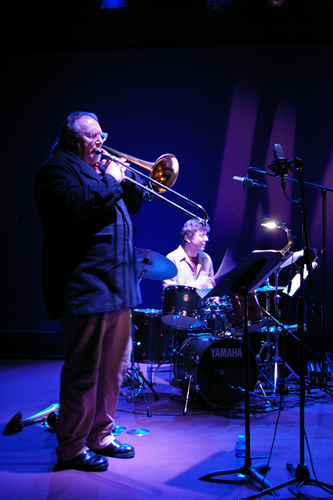
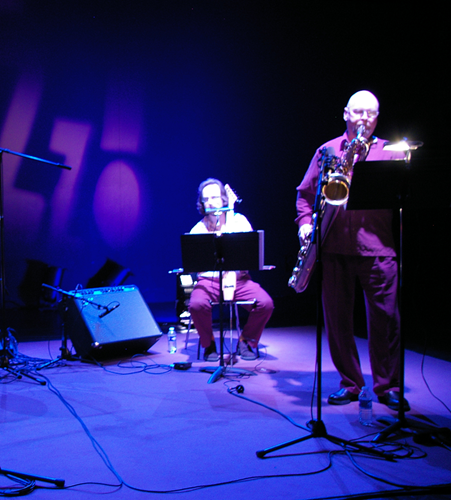
Michael Vlatkovich Quartet, Brugge De Werf, 2009 © Elise Alaimo
THE MICHAEL VLATKOVICH QUARTET
Michael Vlatkovich - trombone, compositions
David Mott - baritone saxophone
Jonathan Golove - electric cello
Christopher Garcia or John Bacon - drums, percussion
THE REVIEWS:
"Michael Vlatkovich isn't your average trombonist. He squeaks, soars, and sears and tears sonic pieces of paper much like a saxophonist. Quite simply, and with all due respect to players like Jed Bishop, Joe Fiedler, Masahiko Kono, Steve Swell, and even my all-time favorite Roswell Rudd, Vlatkovich is the finest trombonist improvising today. While this music isn't exactly "out there," it is far from the "mainstream." There isn't a "blow out" or antagonistic section on this disc and yet all of the cuts have a smidgen of unpredictability that makes them challenging. In the end, it doesn't matter as this music shines in or outside of any context."
JAZZREVIEW.COM
"A commanding improvisational trombonist, Vlatkovich is also a devisor of challenging structures for his bandmates. Vlatkovich loves using word and numerical games to determine compositional structures. There are seldom "themes" as such but, rather, motifs collectively essayed. Around these guideposts, Vlatkovich leaves lot of room in which soloists can navigate. The raucous assembled horn passages have ancestral ties to early New Orleans jazz and Vlatkovich often writes short, concentrated ensemble bursts that hit like sound grenades."
JAZZIZ
"Michael Vlatkovich is coming to town to blow your mind. Michael Pierre Vlatkovich may not be a household name.... yet he still manages to be one of the most extraordinary improvising trombonists in this country as well as overseas. Also a gifted composer and arranger, Vlatkovich is one of the leading talents among Los Angeles improvisational players. Working from the Left Coast since 1973, he is well known for tireless touring, bringing his music all over the United States, Canada, and Europe. A daring and emotionally charged performer, Vlatkovich takes delight in blending a broad variety of jazz and world music styles into his own brand of engaging and unpredictable music. His approach manages to express a raw power and beauty within a minimally structured format that allows extensive group improvisations to lead the way."
ARTVOICE
"Vlatkovich is an arresting writer who works with many different forms - numerical compositions, tangos, waltzes, big band swingers, and more. He also assembles musicians accomplished enough to interpret his pieces with verve and imagination."
L.A. NEW TIMES
"Trombonist Michael Vlatkovich served up a more animated mix of gutbucket grooves and extended form at his Knitting Factory set...His multi-theme pieces flow in ways that feel right to the ear, so they don't feel like patchwork or even suite-like. They also leave lots of room for broad brush blowing."
CODA
"Maybe its the similarity to the slide whistle, but something about the trombone seems to attract musicians who, despite their amazing virtuosity, still retain a mischievous sense of humor. Vlatkovich and his ensemble play thoughtful, melodic free jazz with a wry air.....a little marvel of joyous, minimalist improvisation - consistently swinging but never confined by time"
SEATTLE WEEKLY
"With its blustery, swaggering and bluesy Mingus -like rag-tag amalgam of structure (including interesting support for soloists) and open-ended improvisation, buoyed by periodic rock rhythm underpinning which, amazingly enough, avoids any concession to fusion or pop, and odd striking percussion textures, it's a sprawling, spirited freewheeling set."
CADENCE JAZZ MAGAZINE
"The band is notable for its unusual instrumentation, encouraging pallet, repertoire of originals, and its good intentions...Vlatkovich's resourceful writing provided a framework fro his gritty, muffled-toned trombone."
LOS ANGELES TIMES
"The Michael Vlatkovich Quartet, specializes in tautly constructed group improvisations that provide lost of nourishing food for musical thought; their combinded sounds swing effortlessly yet solidly. From '20's style gutbucket testifying to '60's like "outside" musings and beyond, most of the passing century's musical innovations are encompassed. Blend in a healthy dose of humor and a bit of underlying irreverence and you've the makings of an enthralling evening.
SANTA FE REPORTER
"Trombonist/composer Michel Vlatkovich has a knack for leaving just the right loose ends loose and weaving others into knots that are almost impossible to unravel. His arrangements are characteristically sparse - sometimes startingly so- but the depths of his imagination are so densely packed with the new and the fresh that listening to Vlatkovich blow is to hear improvisational jazz for the first time, every time.
The St. Louis born, musician is considered among the top musical and compositional minds on the Left Coast. That's at least in part because Vlatkovich, is almost entirely fearless when it comes to stretching the limits of jazz well beyond the accepted stratosphere of improvisation. Never timid, shy or subtle, Vlatkovich wrings melodies out of his trombone with brute force, nailing together a wide variety of jazz styles to miscellaneous scraps of world music and jackhammer rhythms. His music is brash, bold and exciting-the way improv ought to be."
THE WEEKLY ALIBI
"The skeletal compositions generate an organized spontaniety that is quite striking because the music is allowed to develop in an atmosphere of considerable freedom"
JAZZ FORUM
"In the spirit of Ornette Coleman, Vlatkovich compositions are often jagged and humorous...Vlatkovich's trombone ranges over as wide a terrain as his tunes, progressing form funky bop to slippery high register pranks to walking bass lines to frog-like croaks.
With its blustery, swaggering and bluesy Mingus-like rag tag amalgam of structure(including interesting support for soloists) and open-ended improvisations, buoyed by periodic rock rhythm underpinning which, amazingly enough, avoids any concession to fusion or pop, and odd striking percussion textures, it's a sprawling, spirited,free-wheeling set."
THE NEWS AND OBSERVER
THE MUSICIENS:
Christopher Garcia - drumset, percussion
Chris was born, raised, and still resides in East L.A. (Never to be confused with West L.A.). His background includes performances in a wide variety of musical settings including progressive jazz, rock, world music, traditional Mexican music, percussion ensemble, soundtracks, and cartoon music.
He attributes his musical growth to his studies with Professor John Bergamo, Pandit Tarnath Rao, Swapan Chadhouri and Leonice Shinemann where he studied tabla, while attending California Institute of the Arts on a full scholarship.
Chris was also a member of the award winning Cal Arts Percussion Ensemble in 1979.
He attributes his "style"(?) to Listening to EVERYTHING, logging in thousands of hours, practicing, rehearsing, performing and touring constantly with musicians interested in stretching and reinventing themselves. Chris' drumming is unusual in that it incorporates not only the standard rhythms and their permutations, but also a fluency with odd time signatures and sonic textures, which he seamlessly incorporates into his playing. He has toured extensively throughout the United States, Canada and Asia.
He has consistently held the drummer/percussionist chair in several Vlatkovich ensembles since 1992.
He has also been the drummer/percussionist of several critically acclaimed ensembles including: Continuum - fusion for the 21st Century, Quarteto Nuevo - a world music improvising chamber ensemble, The Michael Vlatkovich Trio, Quartet, Quintet & Sextet - Avant trombonist, The Jihad Racy, Roberto Miguel Miranda, Christopher Garcia - world music trio, the World Music Percussion Quartet with Gustavo Aguilar, Park Je Chun, Takinojo Mochizuki, The Grandmothers - Ex Mother Of Invention - Don Preston, Roy Estrada, Bunk Gardner, Napoleon Murphy Brock, and duets with Drummer/percussionist Alex Cline, guitarist Nels Cline and multi woodwinds master Vinny Golia.
Selected Discography:
Continuum - Passages
Continuum - Continuum
Live at the Gewendhaus - The Grand Mothers - Napoleon Murphy Brock, Roy Estrada, Bunk Gardner, Don Preston
The Moscow Symphony - Outcast
Quarteto Nuevo - El Musico
Michael Vlatkovich Sextet - Live In Toronto
Michael Vlatkovich Trio - No Zee Two S
Michael Vlatkovich Quintet - Why Don't You See Me?
Obligatos For Terpsichorean Dipsomaniacs - Mark Weber
REVIEWS with MICHAEL PIERRE VLATKOVICH:
"Garcia's playing is vibrant and alive with passion, humor and a good deal of technical prowess, not to mention the breadth of vision necessary to effectively translate such an unpredictable stream of music. And the fact that the trio seem perfectly at home with unpredictably and the endless world of musical possibilities it presents makes them perhaps"
The Weekly Alibi
"Vlatkovich's concepts start with the very aggressive Elvin Jones-muscular beat of drummer Chris Garcia. From this foundation, the piano-less band shifts pattern and time, not in sharp angles but sure-footed movements. They hop from blues to tangos and marches, all the time the trombones are vocalizing, articulating, and encouraging discourse."
ALL ABOUT JAZZ
PERFORMANCE CREDITS:
He has performed with under their name:
John Bergamo, Cal Arts Percussion Ensemble, Alex Cline/C Garcia Duo, Alex Cline Ensemble, Nels Cline/C Garcia Duo , Collage Dance Theater, Continuum, Lukas Foss, Arthur Jarvinen, Bill Plake Trio, Steuart Liebig, Roberto Miguel Miranda, Patrick Moraz, The Moscow Symphony, The Northern Lights Ensemble, Quarteto Nuevo, Ali Jihad Racy, G.E. Stinson, Luis Villegas, Michael Pierre Vlatkovich, Mark Weber, World Percussion Quartet featuring Gustavo Aguilar - percussion from the Americas, Park Je Chun- percussion from Korea, Mochizuki Takinojo- percussion from Japan, World Jazz Ensemble, & others
He also performed with both sidemen for live performances and/or recording projects:
Abhiman, Airto, Nick Ariondo, Michael Bisio, Rob Blakeslee, Jimmy Branley, Bob Fernandez, Ramon Flores, Bruce Fowler, Steve Fowler, Craig Fundyga, Vinny Golia, Jonothan Golove, Michael Jacobsen, Eric Jorgensen, John Klemmer, Daniel Lozano, George McMullen, David Mott, Bill Plake, Bill Roper, Ken Rosser, Joe Rotondy, Harry Scorzo, Aaron Serfaty, Ramon Stagnaro, Andy Suzuki, Anders Swanson, Dean Taba, Arturo Velasco, Tom Walsh
John Bacon - drumset, percussion
John Bacon, percussionist and composer, has performed with Lester Bowie, Roswell Rudd, Bobby Previte, the Buffalo Philharmonic Orchestra, Bobby Militello and as a leader in a variety of ensembles.
He teaches percussion at UB University of Buffalo and is head of Jazz at Villa Maria College in Buffalo, NY. He holds a PhD. in Music Composition from SUNY at Buffalo.
His diverse skills as a percussionist, trap drummer and vibe player have been featured with a wide range of groups including the Slee Sinfonietta, Maelstrom Percussion Ensemble, and the Genkin Philharmonic. His music has been performed by an eclectic collection of musicians, including The Amherst Saxophone Quartet, Leroy Jenkins, the New Jazz Orchestra of Buffalo, the New York New Music Ensemble, Amanda Deboer and the Colorfield Ensemble, Duo Cuentista, Ensemble Laboratorium, Wooden Cities and the UB Percussion Ensemble.
He has toured in England, Italy, Canada, and the US. In 2009, at De Werf Brugge, he was substitute for Christopher Garcia in the Vlatkovich Quartet.
He has recorded with Paul Bley, Roswell Rudd, Don Menza and George Caldwell. Recent CD releases featuring his music include “Pausa Live” with the New Buffalo Jazz Octet on Cadence Records and “Migration” by resAUnance with vocalist Esin Gunduz, cellist Jonathan Golove and pianist Michael McNeil, on FMR records.
John is a 2013 New York Foundation for the Arts Fellowship Award recipient in Music/Sound and a New York State Council on the Arts Individual Artist Composer Commission with Christopher Jentsch 2015.
John was voted Jazz Musician, Jazz Educator and Jazz Drummer of the year 2015 and 2016 by JazzBuffalo.
Jonathan Golove - electric cello
Jonathan Golove is a native of Los Angeles, California and a resident of Buffalo, New York. He currently serves as Lecturer in the Music Department of the State University of New York at Buffalo, where he received a Ph.D. in musical composition as a Woodburn Fellow. His principal composition teachers have been David Felder and Donald Erb, and he has studied computer music with Cort Lippe. He has worked with or participated in master classes given by composers including Marc-Andre Dalbavie, Philippe Manoury, Lukas Foss, Roger Reynolds, Gerhard Staebler, and Walter Zimmermann.
Mr. Golove's works have been performed in a variety of locations in the North America and Europe, by such ensembles as the Ensemble Court Circuit, the Amherst Saxophone Quartet, Maelstrom Percussion Ensemble, and The Instrumental Factor. He has received commissions, awards and grants for his works from organizations including the European Academy of Music/International Festival of Lyric Art of Aix-en-Provence, VOXNOVA, ASCAP, the Yvar Mikhashoff Trust for New Music, Meet the Composer, and the Darius Milhaud Society.
He has written for a variety of ensembles, often in combination with live electronic processing, including (Max's 24 Hours) Pray-O-Mat for two cellos and the IRCAM Signal Processing Workstation, which was performed at the 1996 Sonic Circuits Festival in Toronto. In 1995, Mr. Golove was the first winner of the ASCAP Foundations Leo Kaplan award. His winning composition, Shreds of Evidence, is scored for two pianos, electronically processed spoken text, and video, and was premiered at the North American New Music Festival in February, 1995. A version of Shreds for piano duo was subsequently premiered at the June In Buffalo Festival. Here and There, a work for female voice and percussion quartet, has been recorded by the Maelstrom Percussion Ensemble on its CD release Whirled Music.
Mr. Golove is also an accomplished cellist, having been a student of Siegfried Palm and Ronald Leonard. In 1997 he was featured as soloist in Morton Feldman's Cello and Orchestra with the Buffalo Philharmonic Orchestra, and will perform Gubaidulina's Detto II for cello and ensemble with the Slee Sinfonietta in April 1999. He is active, as well, in the field of improvised music, appearing on a number of recordings with noted composer/performer Vinny Golia.
Mr. Golove has been a founder and co-director of chamber ensembles dedicated to the performance of new music including The Instrumental Factor (Buffalo), Just Like It Sounds (San Francisco), Arc-en-Ciel (Berkeley), and the Three-in-the-Time-of-Two Festival, which had its debut in Cleveland in 1994. He has performed in or composed works for summer music festivals including the Pacific Music Festival, the Rome Festival, and the Sarasota Music Festival. He was a founding member of the Elisha String Quartet, a group which served as the Apprentice Quartet at The Cleveland Institute of Music and participated in the 1993 Julliard Quartet Seminar. In addition, he has performed in the June In Buffalo String Quartet, the Roycroft Festival, and with the Cleveland Octet, a group made up of members of the Cleveland Orchestra.
David Mott - baritone saxophone
David Mott is a graduate of Berklee College of Music and holds the degrees of Master of Music, Master of Musical Arts and Doctor of Musical Arts from the Yale University School of Music, where he also taught graduate composition and directed the Yale Jazz Ensemble. He has been an Associate Professor at York University in Toronto since 1978.
The earliest of his compositions date from 1964, and include chamber works in a style the composer describes as "contemporary western art music", pieces for both small and large jazz ensembles, and compositions demonstrating his spectacular mastery of his own instrument, the baritone saxophone, either by itself, with electroacoustic elements, or in conjunction with his colleagues in the Toronto-based saxophone quartet, 40 fingers.
Mott maintains an enthusiastic interest in the cultures of Tibet, China, Korea and Japan. Many of his compositions bear evocative titles that reflect an Eastern-inspired concern with nature and its ways, or relate to the explicitly Buddhist approach to music defined in his article, Towards a New Mind/Body Music, first published in the journal Musicworks over the course of four issues from 1982 to 1983. His music is recorded on Music Gallery Editions, Opus One Records, Hamagi Records and Unity Records.
Selected Discography:
INTREPID EAR - 1E002 - Reunion Live (With Gerry Hemingway and Mark Dresser) Intrepid Ear
CHANDOS - 9748 - Whale Spirit Rising. Solo baritone with I Musici de Montreal
ARTIFACT ART - 017 - Live Fingers. (With 40 fingers saxophone quartet)
YFA00596 - The Sky Ringing in an Empty Bell. Solo baritone repertoire.
VICTO CD038 - International Baritone Conspiracy. (with Charles Papasoff) Includes Composition God's Clothes for Shaman Bobbi.
ART 013 - Blue Quilt. (with 40 fingers saxophone quartet) Includes composition River of Eyes. Artifact
Unity UTY -150 - Double Feature. (With Chelsea Bridge)
AURCD 1003 - NOJO. (As conductor of the Neufeld/Occhipinti Jazz Orchestra)
Unity UTY 133 - The Standard Line. (With David Lopato) Includes four compositions.
MV008 - Thankyou Records Toronto Live. (With Michael Vlatkovich)
CRI CD 628 - Bang On A Can Live. (performance on Evan Ziporyn's Luv Time)
Sound Aspects Outerbridge Crossing. (With Gerry Hemingway Quintet)
Pressure Points (With Sound Pressure Ensemble) Includes composition Oh!
Mysterious Magnum ¬ Such
Magenta Vintage. Soundprint 9301
Regarding Starlight. Performances on Regarding Starlight and Tiger Running... Nearer Breathing.
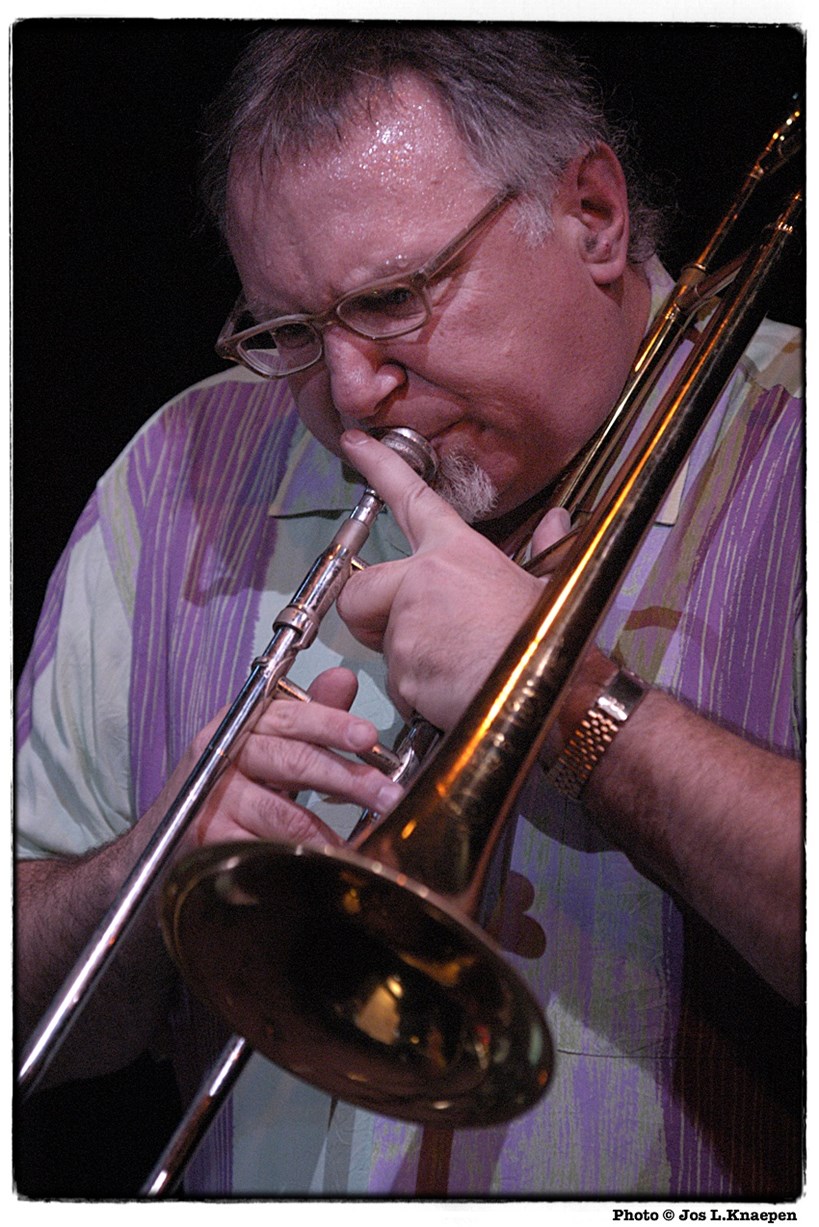
As Leader:
Michael Pierre Vlatkovich – With You JAZZ CAT (pfMENTUM PFMCD142 - 2021)
Michael Vlatkovich - TRYYO Flying Box (pfMENTUM PFMCD112 - 2016)
Michael Vlatkovich - Myrnofant’s Kiss (pfMENTUM PFMCD095 - 2016)
Michael Vlatkovich - 5 Winds: Five of Us (pfMENTUM PFMCD130 - 2015)
Michael Vlatkovich - Mortality (pfMentum PFMCD091 - 2015)
Michael Vlatkovich Septet - Ask 7 (pfMENTUM PFMCD089 - 2015)
Michael Vlatkovich - VLATKO (pfMENTUM PFMCD085 - 2014)
Michael Vlatkovich / Anna Homler / Jeff Kaiser / Scott Walton / Rich West: Here & Here & Here (pfMENTUM PFMCD084 - 2014)
Michael Vlatkovich / C. Lee / K. McLagen - Succulence Of Abstraction (THANKYOU RECORDS CD MV015 - 2013)
Michael Vlatkovich / Clyde Reed / Dave Wayne / Mark Weber - Multitudes Telepathic (pfMENTUM PFMCD078 - 2013)
Michael Vlatkovich Quartet - You’re Too Dimensional (pfMENTUM PFMCD077 - 2013)
Michael Vlatkovich - Elasticity (pfMENTUM PFMCD087 - 2012)
Michael Vlatkovich TRYYO - Pershing Woman (pfMENTUM PFMCD071 - 2010)
Michael Vlatkovich Ensemblio - An Autobiography of a Pronoun (pfMENTUM PFMCD067)
Michael Vlatkovich and Dottie Grossman - Call & Response & Friends (pfMENTUM PFMCD060 - 2009)
Michael Pierre Vlatkovich Quartet – Alivebuquerque (pfMENTUM PFMCD045)
Transvalue w/Chuck Britt – Transvalue Book III The '58 Retractable Hardtop (THANKYOU RECORDS CD MV012 - 2007)
Michael Vlatkovich – Three3 (THANKYOU RECORDS CD MV-013 - 2007)
Michael Vlatkovich / William Roper - Chobraty (Nine Winds Records NWCD0225 - 2005)
Michael Vlatkovich – Across 36 Continents (pfMENTUM PFMCD030 - 2005)
Michael Pierre Vlatkovich Quartet – Double Yellow (THANKYOU RECORDS CD MV011)
Michael Pierre Vlatkovich Trio – No Zee Two Es (THANKYOU RECORDS CD MV010)
Michael Pierre Vlatkovich Tritet – Queen Dynamo (Origin 82420)
Michael Pierre Vlatkovich Sextet – Live in Toronto (THANKYOU RECORDS CDMV008)
featuring Anders Swanson, Bill Plake, Chris Garcia, David Mott, Tom Walsh
Michael Pierre Vlatkovich – Why Don’t You See Me? (THANKYOU RECORDS CSMV007)
Michael Pierre Vlatkovich – Collective Thought (THANKYOU RECORDS CSMV006)
Transvalue w/Chuck Britt – Transvalue Book II Teapot in a Tempest (THANKYOU RECORDS LPMV005)
Transvalue w/Chuck Britt – Transvalue Book I (THANKYOU RECORDS LPMV004)
Michael Pierre Vlatkovich – 9113 (THANKYOU RECORDS LPMV003)
Michael Pierre Vlatkovich – The One That Never Started (THANKYOU RECORDS LPMV002)
Michael Pierre Vlatkovich – Michael Pierre Vlatkovich (THANKYOU RECORDS LPMV001)
As Guest Artist:
Dottie Grossman / Michael Vlatkovich - Call And Response (pfMENTUM CD021 - 2005)
Rob Blakeslee Quartet – LAST MINUTE GIFTS (LOUIE019)
Bobby Bradford – LIVE AT THE LACMA (WB01)
BRASSUM – WARNING LIGHTS (PLU-003)
Vinny Golia Quintet – ONE, THREE, TWO (JAZZ’HALO TS018-019)
Vinny Golia Quintet – RAZOR (Nine Winds Records)
Vinny Golia Quintet – OUT FOR BLOOD (Nine Winds Records)
Vinny Golia Large Ensemble – COMPOSITIONS FOR LARGE ENSEMBLE (Nine Winds Records)
Vinny Golia Large Ensemble – THE OTHER BRIDGE (OAKLAND 1999) (Nine Winds Records)
Vinny Golia Large Ensemble – PORTLAND 1996 (Nine Winds Records)
Vinny Golia Large Ensemble – FACTS OF THEIR OWN LIVES (Nine Winds Records)
Vinny Golia Large Ensemble – PILGRIMAGE TO OBSCURITY (Nine Winds Records)
Vinny Golia Large Ensemble – COMMEMORATION (Nine Winds Records)
Vinny Golia Large Ensemble – TUTTO CON TARE (Nine Winds Records)
Vinny Golia Large Ensemble – DECENNIUM DANS AXLAN (Nine Winds Records)
Rich Halley – LIVE AT BEANBENDERS (Nine Winds Records)
Rich Halley 4 - DUSK AND DAWN (Pine Eagle Records)
Rich Halley 4 - ELEVEN (Pine Eagle Records)
Rich Halley 4 - CREATING STRUCTURE (Pine Eagle Records)
Rich Halley 4 - THE WISDOM OF ROCKS (Pine Eagle Records)
Rich Halley 4 - CROSSING THE PASSES (Pine Eagle Records)
Rich Halley 4 - BACK FROM BEYOND (Pine Eagle Records)
Rich Halley 4 - REQUIEM FOR A PIT VIPER (Pine Eagle Records)
Rich Halley 5 - THE OUTLIER (Pine Eagle Records)
Jeff Kaiser – MUSIC FOR DOUBLE QUARTET (Nine Winds Records)
Jeff Kaiser OCKODEKTET – THE ALCHEMICAL MASS (CD019)
Jeff Kaiser OCKODEKTET – 13 THEMES FOR A TRISKAIDEKAPHOBIC (CD013)
ROVA/ORCHESTROVA – AN ALLIGATOR IN YOUR WALLET (EWCD 0069)
Mark Weber – OBLIGATOS FOR TERPSICHOREAN DIPSOMANIACS (Nine Winds Records)
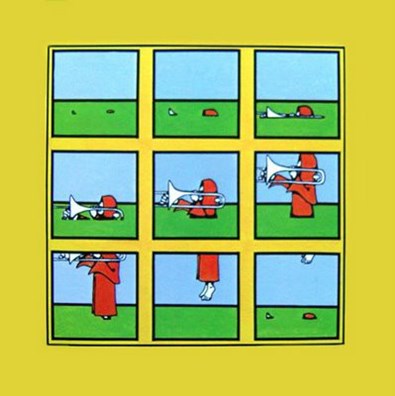
SIDE 1
1. 580 8085
2. Eaton Canyon Or Was It Eat On Can You?
SIDE 2
3. Way Way Way Way Way Down Home
4. Color Of Sound
5. Out Of The Wall Into The Night
Personnel:
Michael Vlatkovich – trombone / compositions
Lou Gonzalez - trumpet
Roy Poper - trumpet
Bill Masonheimer - tuba
Jay Hutson - woodwinds
David Riddles - woodwinds
Toni Markus - violin
Michael Jacobsen - cello
Gary Denton - drums
Harlan Goldberg – drums
Produced by M. VLATKOVICH
Music composed by M. VLATKOVICH
© 1981 JULIUS IVORY MUSIC (A.S.C.A.P.)
Recorded at Gary Denton Studio by Gary Denton
Mixed by Gary Denton and M. Vlatkovich
Mastered at Location Recording Service by David Kulka
Cover art and album design by David Riddles
REVIEWS:
"New music from an adventurous and facile trombonist".
Doug Ramsey
"Vlatkovich is a free jazz trombonist and his debut album puts him in local company. Though his open-ended compositions invite turbulent, often congested ensemble tie-ups. it's his rich, harmonic voicings that stand out. This is not an easy record to find the handle on and it demands full attention. For the most part, the demand is justified. ‘5S0-8080' is a group roar that brings to mind a Monkian traffic jam. It's a little too congested for its own good in the stop-and-go vortex. A funkier rhythm section could have capitalized on the open stretches, and a bass is sorely needed on this album. 'Wav Down Home is Vlatkovich’s best show of strength as an instrumentalist and perhaps as composer The multiphonics on his restrained tailgate intro are full and vivid frontline voices trombone, trumpet, saxophone and tuba are sumptuous and offer the strongest nod to traditional jazz. Gary Denton's shuffle march beats hold up more than his share of the show. 'Color of Sound' is all surrealist harmony and no rhythm. Michael Jacobsen's cello rolls along like a lazy stream with complementing tributaries from trombone, Bill Roper's trumpet and David Riddles' tenor sax".
Kirk Silsbee MAR 4—MAR 17
"There are a lot of musicians today who subscribe to the adage "Let the music speak far itself”, and this statement rings true in many instances. But I think when someone takes it upon himself to release an album and he and most of the other participants are relatively unknown to the general listening audience (Toni Markus being the only familiar name listed here. having toured and recorded with Gunter Hampel) then some sort of biographical data is in order. This of course is only a minor flaw in an otherwise satisfying collection of performances where group effort takes precedence over individual virtuosity. Here it is imperative that the players involved have the strength and maturity to restrain their egos and channel their energies in a common direction.
Trombonist, composer Michael Pierre Vlatkovich has been successful in fashioning some unique charts that not only challenge his able sidemen, but also the ability of the listener to determine what is written and what is improvised. There is a certain amount of stiffness present, but not enough to impede the natural flow of the music. Although it is difficult to scrutinize the improvisational capabilities of the individual players, I think it is safe to assume that they are all more than competent, Vlatkovich proving to be a convincing soloist, with good chops and a big, clear tone. If he continues in his present direction, I will anxiously be looking forward to his next offering".
Gerard Futrick, Coda Magazine
"Take 10 musicians. Make sure they have some reading and jazz background. Introduce structural parameters, sort of like meaty skeletons which the musicians (in different combinations) will fill in. Stress cooperative interaction with an emphasis on the whole in terms of interplay rather than on individual soloing per se. Also, stress lyrical modes of Improvisation and mainly floating free time. And there, more or less, one has this attractive little album. Trombonist/composer Vlatkovich's recording debut is only marred by the occasional cutesy stiffness of the shuffle "Way Way Way Way Way Down Home." It is enhanced by the empathy of the musicians and the curious electronic sound of Michael Jacobsen's cello".
Milo Fine, OP Magazine
"MICHAEL PIERRE VLATKOVICH is a trombonist, but judging from his self-titled release on Thank You records (MVOOI) he is also a composer and arranger of some ability. We can hear reminders of Mingus, Braxton, Ornette, even touches of Ellington in his constructions, but if they are indeed influences, they are more of the heart as none of Mr. Vlatkovich's music as presented on this release is cloning. It is very original free compositions, brilliantly conceived and strongly executed. In some ways the music on the five compositions (580 8085/ Eaton Canyon or Was It Eat On Can You?! Way Way Way Down Hamel Color Of Sound! Out Of The Wall Into The Night) reminds me of Ornette's "Free Jazz" for double quartet - it evokes that structured spontaneity though the sculpturing here has more differentiations between instruments. How much of this is composed I don't know. It seems obvious to me that there is a compositional framework, but it breathes and allows a great free sense while being structurally tight. The improvisations are fresh and articulate, there is great flexibility, and swing, and challenge runs constant to these ears. It's nice to know artists are still being heard in the United States, albeit obscure.
The fact that few will probably hear this and less acknowledge it matters little in artistic terms. This record exists - the art is there. Whether or not the effort is made to receive it has no bearing on its artistic value. At best Cadence is a service and we will be filling that service in the best possible manner if we can help bring this music to its audience. Mr. Vlatkovich has done his part, now we have tried to do our part - the rest is up to you. Make this a gift to yourself. The inspiration this record has brought to me has left no easy segue for personnel: so here it is. Mr. Vlatkovich works with a quartet, quintet or septet made up from the following superior musicians: Lou Gonzalez, Roy Poper (tpts.1- Bill Masonheimer (tuba), Jay Hutson. David Riddles (woodwinds), Toni Markus (vIn), Mike Jacobsen (cello), Gary Denton or Harlan Goldberg (dms). Good stuff that gets gooder and gooder".
Cadence, January 1982
"In this music one can hear reminders of Mingus, Braxton, Ornette and even touches of Ellington, Brilliantly conceived and strongly executed".
"1982 Editor's Choice, New Releases"
Bob Rusch, CADENCE
"Michael Pierre Vlatkovich has it more together but maybe less visionary for a contemporary big band date, for which he has composed all the impressive material. I didn’t know they had this much going in Glendale. Worth a listen".
Rafi Zabor, Musician Magazine
"Two albums too good to get away without a mention trombonist Michael Vlatkovich on his own label, formed in 1981. Vlatkovich was born in 1951 in St. Louis, Missouri. He attended the St. Louis Institute of Music on a scholarship and later studied at North Texas State and with Bernard Scheider, principal trombonist for the St. Louis Symphony. Since 1973, Vlatkovich has been based in the Los Angeles area, where he free-lances in all kinds of musical situations, as do the other musicians on these two albums.
Vlatkovich is an adventurous and convincing soloist who says, "I want the music I create to exist as an. ever present, ever changing environment of audible and inaudible sounds where an intermingling of emotions will take place. Once experienced, never lost. I hope to rekindle emotions which all of us know and feel but sometimes fail to admit."
MV-00I is a fresh and distinctive fusion of avant-garde, jazz, and blues, liberally spiced with humor and strongly played.
MV-002 employs a similar cast and instrumentation but with the addition of Devorah Vlatkovich on piano, playing in a somewhat minimalist style. The skeletal compositions generate an organized spontaneity that is quite striking because the music is allowed to develop in an atmosphere of considerable freedom. A feature of Vlatkovich's writing that pops up here and there throughout both albums is his use of short rhythmic horn figures to prod the ensemble in one or another direction.
The two discs differ somewhat due to the presence of the piano in the second. Of the two, I tend to prefer MV001, although the beautiful performance of The One That Never Stayed on MVuu2 is the best thing on both albums. The recording quality is certainly very good, with strings and woodwinds offsetting a rather brassy mix quite effectively".
Keith Knox, Jazz Forum
"The final two albums are by trombonist Michael Vlatkovich, a St. Louis native who has shifted his base of operations to Southern California. Both "Michael Pierre Vlatkovich" (Thankyou MV00l) and "The One That Never Stayed" (Thankyou MV002) employ roughly the same personnel. They apparently come from 1981/83. This is accessible avant-garde music, containing both movement and solid form, yet a freedom that never gets chaotic. Vlatkovich's burly trombone stands out, as do such players as trumpeters Lou Gonzalez, Roy Poper or Mark Underwood. Woodwind players Jay Hutson. David Riddles or Tony Garcia, tuba player Bill Masonheimer and some rhythm players".
MV001 4 stars; MV002 3.5 stars.
Will Smith, Jazz Sounds, Sunday World-Herald, June 9, 1985
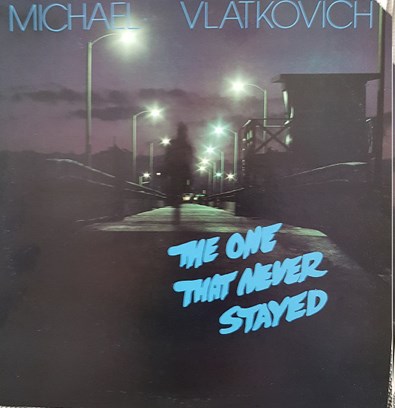
SIDE 1:
1. Franny Bee
2. Happy Birthday To You
3. Two Tomatoes Out On A Date
SIDE 2:
4. Four Tomatoes Out On A Double Date
5. The One That Never Stayed
Personnel:
Michael Vlatkovich – trombone / percussion
Devorah Vlatkovich – piano / voice / percussion
Lou Gonzalez - trumpet
Mark Underwood - trumpet
Bill Masonheimer - tuba
Tony Garcia - woodwinds
David Riddles - woodwinds
Michael Jacobsen - cello
David Crigger - drums
Gary Denton - drums
Harlan Goldberg - drums
Produced by M. & D. Vlatkovich
Music composed by M. Vlatkovich
© 1983 JULIUS IVORY MUSIC (A.S.C.A.P.)
Recorded at Gary Denton Studio by Barney Fuller
Mixed by B. Fuller, M. & D. Vlatkovich
Mastered at Location Recording Service by David Ellsworth
Photography by T. Arden Franklin
Album design by David Riddles
REVIEWS:
"Vlatkovich is an expressive trombonist from Glendale who favors red shoes and a green horn. Like his debut album of last year, this one has a distinctive compositional approach. Vlatkovich has struck a good balance between polyphonic improvising and structural concerns. "Franny Bee" is a plaintive trombone banquet and "Happpy Birthday" a little march with stunning harmonic backdrops. Devorah Vlatkovich's piano serves as rhythmic underpinning throughout but on the duet title track she holds up her half of the sky admirably".
Kirk Silsbee
"Two albums too good to get away without a mention trombonist Michael Vlatkovich on his own label, formed in 1981. Vlatkovich was born in 1951 in St. Louis, Missouri. He attended the St. Louis Institute of Music on a scholarship and later studied at North Texas State and with Bernard Scheider, principal trombonist for the St. Louis Symphony. Since 1973, Vlatkovich has been based in the Los Angeles area, where he free-lances in all kinds of musical situations, as do the other musicians on these two albums.
Vlatkovich is an adventurous and convincing soloist who says, "I want the music I create to exist as an. ever present, ever changing environment of audible and inaudible sounds where an intermingling of emotions will take place. Once experienced, never lost. I hope to rekindle emotions which all of us know and feel but sometimes fail to admit.
MV-00I is a fresh and distinctive fusion of avant-garde, jazz, and blues, liberally spiced with humor and strongly played.
MV-002 employs a similar cast and instrumentation but with the addition of Devorah Vlatkovich on piano, playing in a somewhat minimalist style. The skeletal compositions generate an organized spontaneity that is quite striking because the music is allowed to develop in an atmosphere of considerable freedom. A feature of Vlatkovich's writing that pops up here and there throughout both albums is his use of short rhythmic horn figures to prod the ensemble in one or another direction.
The two discs differ somewhat due to the presence of the piano in the second. Of the two, I tend to prefer MV001, although the beautiful performance of The One That Never Stayed on MVuu2 is the best thing on both albums. The recording quality is certainly very good, with strings and woodwinds offsetting a rather brassy mix quite effectively".
Keith Knox, Jazz Forum
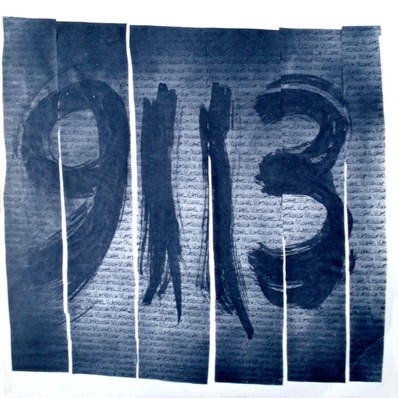
SIDE A:
1. Fiends With An Are
2. They Are ... I Am / All I See Are Firetrucks
3. When Do Clowns Cry ?
4. Complete With Black And White Cows
5. Serphemple Dog
SIDE B:
6. But My Chair, In The Cafetaria
7. Where Hello Means Good-Bye
8. 9113
9. 9113: Black & White And Mostly Brown
10. Friends 9113
PERSONNEL:
Michael Vlatkovich – trombone / percussion
Chuck Sabatino – bass / percussion / voice
Tony Garcia – soprano / tenor saxophone
Devorah Vlatkovich - voice
David Crigger - drums
Vinny Golia - baritone saxophone
Michael Jacobsen - cello
Bobby Bradford - cornet
Bill Mays – piano
Produced by M. Vlatkovich
Music composed by M. Vlatkovich
© 1984 JULIUS IVORY MUSIC (A.S.C.A.P.)
Recorded by Tom Manasian (no studio), David Crigger at David Crigger Studio,
Gary Denton at Gary Denton Studio and Tom Herzer at Studio In A Closet
Mixed by B. Fuller, M. & D. Vlatkovich
Mastered at Location Recording Service by David Ellsworth
Cover art and album design by Michael Vlatkovich
REVIEWS:
"Trombonist Michael Vlatkovich's "9113" is a series, of avant garde duets by the trombonist with various partners. The record presents interesting insights into post-Coleman free jazz. Vlatkovich keeps the 10 performances concise and thematically on course. In The spirit of Coleman, his compositions are often jagged and humorous. "Complete With Black and White Cows," with David Crigger's drums, swings the most. A couple of tracks have a Duke Ellington flavor - "White, Black & While, and Mostly Brown" (featuring Bobby Bradford's plunger. muted cornet) and "Friends 9113" (with Bill Mays' Ellington-like piano).
Deborah, Vlatkovich's voice move's in eerie long tones against the voice-like trombone on two cuts. At the other emotional pole, the trombone and Vinny Golia's baritone saxophone spar angrily but humorously.
Vlatkovich's trombone ranges over as wide a terrain as his tunes, progressing from funky bop to slippery high-register pranks to walking bass lines to frog-like croaks. His two duets with electric bassist Chuck Sabatino bring in contemporary electronics and overdubbing. An interesting and frequently enjoyable record".
Owen Cordie, Raleigh News and Observer, March 9, 1986
"Trombonist/composer Vlatkovich throws us a changeup this time around. In contrast to his last two orchestral albums, here he's performing duets with various players. Through the use of overdubbing, he creates voicings that retain the compositional emphasis on the blending of instruments.
There's often a quietly comic quality to Vlatkovich's music that's hard to put your finger on. The trombone seems oddly stoic in "All I See Are Fire trucks" while Tony Garcia's tenor sax dances around it. The picture I get is of Buster Keaton standing in a puddle of water with a trombone in his hand. By contrast, when Vinny Golia lends his baritone to "But My Chair, In The Cafeteria!" the two horns cavort like Laurel and Hardy, wrecking a hardware store.
The trombone/vocal duets strip down the structure to pure harmony and no movement, in some beautiful tone-matching. When Vlatkovich wants to tread on blues ground, he wisely engages cornetist Bobby Bradford, a supreme blues player. The use of space between notes and intervals is dislocated and Monkian, like sidestepping cow pies in a pasture. Appropriately, it's the exchange with pianist Bill Mays that is the most lyrical, yet it's also quirky and bluesy. Like his other albums, Vlatkovich lets us know on 9113 that there are a lot of different musics in him and they're just about all worth hearing. Like a good compilation record, this one will keep drawing you back and exposing more facets".
Kirk SiIsbee, LA Reader, February 7, 1986
"Trombonist/composer Vlatkovich's third album is a set of 10 duets. But you don't have to be a trombonist to enjoy it: it's full of musical variety and strong playing. Stylistically it ranges from jazz to New Music, pairing the trombone with bass/percussion. Two saxophonists (Vinny Golia is one of them), voice. drums. cello, comet (Bobby Bradford), and piano. Highlights include two lovely eight part overdubbed trombone and voice pieces reminiscent of Ugeti's choral music (with Devorah Vlatkovich), an Ornette Coleman-like abstract blues duet with Bobby Bradford, and a final piece in which pianist Bill Mays demonstrates both stylistic breadth and a strong left hand".
Mark Sullivan, Option Magazine
"For his 3rd LP, trombonist/composer Vlatkovich has stepped out of the larger ensembles featured on his previous efforts into a series of duets with various collaborators. The pieces featuring Devorah Vlatkovich ("When Do Clowns Cry?", "Where Hello Means Goodbye") and bassist/percussionist Chuck Sabatino ("Fiends With An Are". "Serhemple Pog") utilize overdubbing. The former are somewhat aimless floating tone poems while the latter are in the form of miniature suites with more than a little humor. ("Pog" is a bit overdone in that department as well as being too long.) 3 of the remaining 6 cuts feature improvised sections (spotlighting call-response approaches) directly developing from the ending with tightly structured and executed heads. Of these, the title cut, with the rather inventive arco stylings of cellist Michael Jacobsen, is particularly invigorating. "They Are...1 Am/All I See Are Fire trucks" features two juxtaposed strategies. The first deals with held tones and slowly developing melodic material that appears totally composed, while the second heads into more aggressive (and improvised) interaction. (Featured here is the rather nondescript soprano/tenor work of Tony Garcia). The remaining 2 tunes are more open, with the bluesy "9113: White, Black & White and Mostly Brown" being the album's highlight. Cornetist Bobby Bradford is in excellent growling form as he pokes and jabs with Vlatkovich. The leader's loose broad-toned stylings are also heard to good advantage on "Fiends", the title cut and "Complete With Black And White Cows" (featuring drummer David Crigger)".
Milo Fine, Jazz World, 19 #73 Vol. 17
"The talented trombonist/percussionist breezes through nine ambitious duets with the likes of Vinny Golia and Bobby Bradford. "Fiends with an are" and "9113" are tastefully over-dubbed with Chuck Sabatino's bass and percussion; Golia's and Bradford's pieces are fascinating, but don't look for any tunes to snap your fingers to. For adventurous ears only".
Be-Bop And Beyond, March/April 1986
"While Vlatkovich's LP is a series of duets and Harris' features a fleshed-out septet, both trombonist/composers show an interest in varied approaches for composition/arrangements. Harris is rooted in a Jazzier swinging ~ mold overall (his music, as well as his playing. tends to swagger more), while Vlatkovich opts for a more constrictive outlook. Though he can, when the situation calls for it, cook quite heartily. Vlatkovich touches on rather neo-contemporary classical areas with "Clowns," "Hello" (featuring Devorah) and the ''They Are. . . Firetrucks" medley (with Garcia). While Harris heads into a similar milieu with "D.A.S.H:' and "Journey." Though Harris' rather haunting conception for the former features busy percussion from Moye, subtle brush work from Higgins and lovely interaction between the horns and cello is very engaging, it doesn't sustain interest for its eight minutes. The latter a somewhat free-floating soundscape with a decided scenic ambiance and another lush cello line (this time of a mournful nature) fares better. Vlatkovich's overdubbed pieces with his wife are rather aimless tone poems and the exercise with Garcia is somewhat flat, particularly me first half which features half tones and slowly developing melodic material.
More overt Jazz structures produce the impetus for Vlatkovich's "Cows," "Chair," "9113," "Brown" and "Friends" and Harris' "High," "Faces" and "Lorna." The latter Harris piece is a lush ballad that features the leader's most restrained solo on the LP, though the structure, like "O.A.S,H." wears out its welcome "High'~ and "Faces" are the album's highlights -- complex arrangements executed with flowing grace, Harris creates very distinctive harmonies wrapped in effective voicings throughout the LP, but here, he utilizes vacillating change-up structures that spotlight the harmonies to greater effect. Both have a Latinish feel though" Faces' also digs into neo-Bop terrain. They also boast strong Harris outings featuring his attractive, blustery, loose, and sometimes a bit off-0the-wall stylings. (Adept solos from Dara on "High," featuring effective sparse bursts, and Holland on "Faces" are also of particular interest.) The first three aforementioned Vlatkovich pieces (with Crigger, Golia and Jacobsen respectively as the leader's foils) present call-response improvised dialogues directly developing from and ending with tightly structured and executed heads. All three are quite energetic with Jacobsen's inventive arco cello work on the title cut standing out. The other two tunes featuring Bradford and Mays respectively, are more open in conception with the former being the album's highlight. Bradford is in excellent growling form as he pokes and jabs with the leader during this six-minute Bluesy exploration. The remaining piece(s) on each album regretfully fall into varying amounts of pretension. Harris' attractive intricate harmonies are overwhelmed by the jive semi-singing street-talk chanting that is the focus of the loose rocking "24," And Vlatkovich's strong playing on "Fiends" (his somewhat loose broad, tones stylings are also heard to their best advantage on the title cut and "Cows") is not quite enough to salvage the cute over-dubbed miniature suite (featuring Sabatino) who is also on hand for the even cuter "Pog," which would have been more aptly entitled "Pog" as it tends to do just that). , Overall, Harris' outing is the more substantial of the two, though Vlatkovich's has its moments".
Milo Fine, Cadence, February 1986
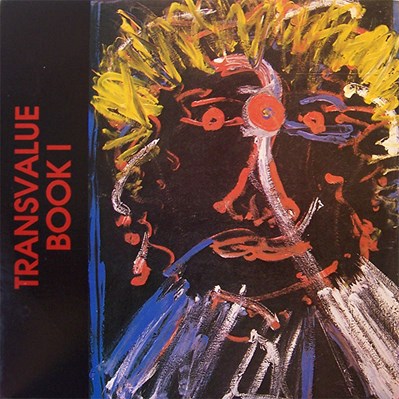
SIDE 1
1. #76 (To Those Upon Whom)
2. #21 (To Act)
3. #57 (Lacking horror You Smile)
4. #43 (Our Friendship Is Young)
5. #35 (The Voluntary Hostage)
SIDE 2
6. #60 (I had a Four Blanket Night)
7. Leper’s Rhapsody
8. Anima/Benediction
Personnel:
Michael Vlatkovich – trombone / compositions / sounds
Chuck Britt – poems / vocals / sounds
Dominic Genova – bass
David Crigger – percussion
Lou Gonzalez – trumpet
David Riddles – woodwinds
Vinny Golia – woodwinds
Warren Hartman – keyboards
Bill Masonheimer – tuba
Gary Denton - guitar
Collaboration number one for Vlatkovich, Britt and Crigger.
Produced by Charles Britt and Michael Vlatkovich
Cover Art: Charles Britt
Photography: Aldo Panzieri
Recorded at David Crigger Recording Studio by David Crigger
Mastered by David Ellsworth at Locations Recording Services, Inc.
Liner notes
TRANSVALUE BOOK I
For all women who have resisted enslavement
For all men who are willing to change
For all men and women who care for each other
To hear a visual sensation
To see a sound
To begin exploring, helping and questioning
To begin swimming with the sunlight of known sensation above
The unfamiliar deep ocean of potential below
To be nudged aside by inner experience as it bobs to the surface
To pull it ashore •••• perhaps
To wonder what on earth it might become ••••
•••• Giving inner experience a life in the sunlight can be dangerous, boring, difficult, fun or even sublime work. But beware of simple mechanical helpfulness. Inner experiences may be suited to life in the light of awareness but they may burn under the sun of sharing. Whatever these upwelling inner experiences become, the real work/play for us will be caring enough. Caring enough to listen. Caring enough to see. Caring enough to know the experience. And beyond the concrete we must care enough to listen for what can't yet be heard and to look for what can't yet be seen. We must give these wet breathless orphans a home, a structure, a matrix. They may survive and flourish or they may melt back into the wet night of the shadow.
The danger to all of us is purely and simply the living risk of being in contact with the dynamic soul. The source. Our life renewing contact with a power greater than ourselves who could demand at any moment that we change.
The alternative is to live in a pretend mechanical world that includes only the concrete. In this fantasy world the soul is imagined to be just another old, obsolete and worn myth/cog slowing down the omnipotent reality-defining machine of society.
Reality, however is defined by the soul.
I am a fortunate man. I met Michael Pierre Vlatkovich in 1980. Michael is a great builder of environments where he invites inner experiences to the surface. Then using his compositions, his trombone, his feeling and his humor he attempts to nurture them. I believe that listening to his music helps me as I try to understand all the new languages.
We hope that you will not only listen for what is in the bright sunlight but also look for what is in the dark ocean letting your own experiences bubble and bob to the surface and together we will wonder what on earth they might become.
CMB November, 1985
Michael and I are indebted to the gifted designers of sound that have generously given of their inner world to help create this sound book.
REVIEWS
"I played composition #43 on Dec 2. I like the album. It is certainly a performance work. You’ve got a great voice! Tom Waits meets Captain Beefheart. Works great with the music. What a contrast! It’s wacky and eccentric. I like the music too! I like it best when tough, funky and funny. I love the trombone!!"
Jacki Apple - HIGH PERFORMANCE
"I play it a lot! Will definitely play it on upcoming special. #60 is the “Best Rap Song” of the August /September sweeps in Atlanta."
Patrick Dowdey – WREK, ATLANTA
"Each is an outstanding player deserving of wide critical and popular acclaim, together this unit burns."
LA READER
"...this Britt guy is out there, growlin' and shoutin' fairly unfathomable impressionistic (though not unhumorous) images of sex, morality and transcendence..."
OPTION MAGAZINE
"We enjoyed Vlatkovich’s 1st and this one too. Nice to have art jazz and poetry together. Wish there was more of it."
Roy Durfee – KUNM-FM ALBUQERQUE
"I have been listening to the trombonist, Michael Vlatkovich and the poet Charles Britt, the ensemble on Transvalue Book I, a production of Thankyou Records. Everyday (or almost everyday) something is going on around Los Angeles, but once in a while something great goes on there. Something like this blend (encounter), something like this existential poetry evocative of the furies of Bukowski, melting with the pure tones of the trombonist and his musician friends. If you want to impress the current person in your life here is “the” recording to give."
J. Yves Picoron, Presse-Ocean, Nantes, France
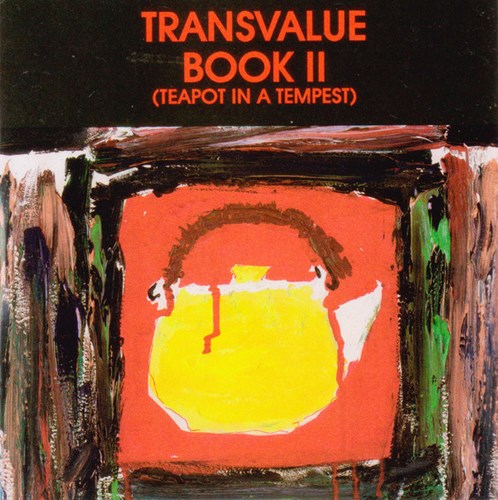
SIDE 1
1. All The Little Worries
2. Defiant Milk
3. Latent Monk
4. The Fatherr Stone
SIDE 2
5. Writer's Tool/Meal
6. Rapsodic Turtle
7. For Mike
Personnel:
Michael Vlatkovich – trombone / music / sounds
Chuck Britt – poems / vocals / sounds
Dominic Genova – bass
David Crigger – percussion
Lou Gonzalez – trumpet
David Riddles – woodwinds
Vinny Golia – woodwinds
Warren Hartman – keyboards
Bill Masonheimer – tuba
Rory Stuart - guitar
Brad Bennett - vocalist
Devora Block - vocalist
Aaron D. Britt - vocalist
Bobbi Liberton - vocalist
Gavin M. O'Sullivan - vocalist
Allison Pipitone - vocalist
Damon Pipitone - vocalist
This is collaboration number two for Vlatkovich, Britt and Crigger.
Produced by Charles Britt and Michael Vlatkovich
Recorded by David Crigger at David Crigger Recording Studio
Cover Art: Charles Britt
Mastered by David Ellsworth at Location Recording Services, Inc.
Poems and music performed up and down the West Coast and in Germany from 1985 through 1989.
REVIEWS
"Is It folly to seek a life of both passion and peace? Our friends from the east would perhaps shake their heads and say that In order to have either I must pull myself apart from the people I love and be separate. Actually my Protestant roots tell me about the same thing. Sometimes when I am most enjoying myself ... when I feel most myself ... like when I am with my Love or when I am debating with colleagues or students or when I am performing my poetry or when I am working with patients, I sense a dark cloud descending over our heads wlthin the room and John Calvin’s head comes out of the billowy darkness. He scowls at me. He wags his finger at me. Then the word "HEDONIST' appears in a cartoon balloon at his mouth. But It seems to me that the Conservatives have their way to deny feeling and the liberals have thefr own… the Catholics, the Masons, our families, the Unions, the professional organizations, the clubs, the friendships, the Marines, the Communist Party, our therapists…Each group in its hypnotic preoccupation with itself has Its own way to deny feeling.
We are reminded and reminded of the danger of feeling. The ego can be hurt, the ego can take over, the life can be ruined, it Is not polite, humans are not responsible. It seems to me that if we are ever going to get to the point of being able to have both passion and peace in the same life as part of the normal course of events we had better emerge from our hypnotism and do passion and do peace until we get It right. I admit that this is dangerous. But I submit that the most chancy life is the naive life. Feelings are never a "Tempest In a teapot". They are our first tool of survival. They are our flash light In a dark room. But we tend to keep the flashlight turned off… or we keep shining the flashlight into our own pocket instead of shining it Into the dark room. We don't seem to know what feeling are for. We are teapots In tempests. We are rather desperate to find where we are but we are unwilling to look with our feelings. I am betting that our feelings will not only tell us where we are but how to survive there. We are no more likely to find peace by thwarting feelings than we are by letting them run rampant. We must use our feelings in an effort to find the right container for the moment. The right structure for each of us for each moment. Not John Calvin's structure, not any other's structure. The structure that will work for me Is the one i find with my own flashlight … now." CMB April 1988
"Here we go around the kidney stone! At their own expense, the few but knowledgeable fans came (from as far away as Frankfurt) to see artists at Hinterhaus-Exile. An extraordinary highlight was offered there behind the simple title “Music and Poetry” hid three energetic, outspoken LA performers who had managed to fit in a short but very substantial debut in the Rhein-Main area."
Between Breman and Zurich
"An earsplitting introductory shout from the powerful but humorous Chuck Britt (a soulful guy), and off they went. “That was ‘#21’”, trumpeted the vocal acrobat, as the well-balanced trio swelled, in effect, to fill all inner and outer space.
The rather subtle composer and trombonist, Michael Vlatkovich at times allowed glowing, tender themes to soar always focused in perfect synch with multi-instrumentalist Vinny Golia. Then again picturesque miniature sound studies would appear in flowing alternation with west coast swing, funk or “siren” sounds. Unbridled joy in play is the distinguishing characteristic of Transvalue, a delight full of changes and surprises for the audience.
“Free transformation” unfolded with soft onomatopoeia, rattles, virtuoso wind-up “gebetsklapper” appropriated oil cans, and children’s playthings, after “underground and life” until temporarily reined-in Britt repeatedly whispered, then repeatedly hollered “Its Me!” From his voluminous chest resounded a deep base voice."
Translated from Wiesbaden Tagblatt, May 15, 1989
"This... strange but intriguing production brings together poet Charles Butt, delivering his own work, and trombonist Michael Vlatkovich leading an ensemble for which he has composed music drawing on both jazz traditions and current ~ "new music" ideas. Category just doesn't apply here. If you free associate a little, this session might remind you of the meeting of jazz and poetry in murky, big city cellars during the days of the "beat generation." The sources of stimulus and the subjects may have changed, but this '80s incarnation of the genre is still socially aware, at its core. Another album for a special audience."
Ottawa Citizen, October 14, 1988
"The music is quite stimulating and it makes one wish for another Vlatkovich record. Charles Britt sounds like he had fun doing the LP - you should have as much fun listening."
RICHARD KAMINS – CADENCE
"Britt writes simultaneously ridiculous/sublime prose and complements his angst-laden but passionate delivery with a backing crew of stellar musicians."
RICHIE UNTERBERGER – OPTION
"Vlatkovich does and impressive job of matching the sound with the moods of the words. Britt’s impressions try to be the agent of catharsis and the listener can be (if in the proper frame of mind) moved by their violence and strange beauty."
CADENCE
"Michael's hyper-textured compositions create a direct, exciting spatial relationship with the words of poet Chuck Britt. Chuck's narrative voice punctures the boundaries of jazz... frilly trombones to circus -like mayhem sounds trace the path led by Checks bellowing-whispering-lamenting vocalizing. His throaty words range from embraceably morbid to soft and angelic. Its depth is graphic."
LOOKING AHEAD (COASTAL JAZZ AND BLUES SOCIETY, VANVOUVER, BC)
"Vlatkovich, saxist Scott Raffel and, especially, trumpeter Jim Knodle carried on long "conversations," rivaling Britt's poetry in expressiveness....Britt meanwhile, cut through the din, front and center, preaching and exhorting his own brand of cracked whimsy. Imagine a surrealistic Popeye up on a soapbox, eager to relate his dreams, and you get the idea."
BRUCE GREELEY - EARSHOT JAZZ
"Vlatkovich draws inspiration from Ornette Coleman while Britt charges through text whispering, shouting and singing about sex death and other poetic themes."
HEATHER WISNER - PORTLAND DOWNTOWNER
"Chuck Britt & Mike Vlatkovich with members of One Hand Clapping and Circular Cowboys AFLN Gallery 1 June 29. Having just listened to the long awaited re-release of Jack Kerouac's recordings, I was all set for a provocative night of poetry and jazz. Although by no means household names, poet Chuck Britt and composer/trombonist Mike V1atkovich, in performance with musicians from One Hand Clapping and Circular Cowboys, were sure to be interesting, if only by virtue of the venue. The AFLN Gallery is one of the few spots in Seattle that regularly books alternative jazz. Britt, who has recently moved to Clear Lake near Mount Vernon, is a big man, both in size and exuberance, and his voice is as deep and gruff as an old salty sailor. He has been collaborating with L.A. based Vlatkovich for over four years, and they have released a couple of records under the title Transvalue on their own Thank You label that features other stellar Southern California musicians such as Vinny Golia.
The connection to Kerouac is not a very apt one, for this was not some casual beatnik jam session. All the pieces were elaborately composed with even drummer Jeff Ferguson intently reading off a music stand much of the time. One composition seemed jerky and pointillistic while another was cubist or multi-directional. But perhaps that was somehow due to the influence of the paintings on the gallery wall. This is not to say that there was no improvisation, for the musicians were often left long stretches for soliloquies of their own, Vlatkovich, saxist Scott Raffel and, especially, trumpeter Jim Knodle carried on long "conversations," rivaling Britt's poetry in expressiveness, Ferguson, too, set aside his sheet music to come up with one of the best solos that I've heard him play, ending with a timpani-like manipulation of the drumhead. The leaders had a keen sense of theatrics, too, never allowing the musicians a straight solo without inserting plenty of odd percussion and whatnot straight from the kitchen and toy room: trombone whistles, a Quaker Oat box rattle, a jar of nuts, toy gun, siren and so forth. Unfortunately, the sound quality was not the best. Bassist Doug Lilla's amp continued to pick up some outside radio station all evening. Britt, meanwhile, cut through the din, front and center, preaching and exhorting his own brand of cracked whimsy. Imagine a surrealistic Popeye up on a soapbox, eager to relate his dreams, and you get the idea. At one point Britt even strode into the audience and individually berated us with his favorite litany, "No one can do me but ME!" He moaned a troubled love song, belched out a story about eating too much and finished off with some rough lines entitled "Anima Benediction." Hopefully, with Britt now living in the area, we'll soon be hearing more from him."
Bruce Greeley, Seattle
"CHARLES BRITT's first album was a dark affair, filled with diatribes and black humor. There's more humor on TRANSVALUE BOOK II, TEAPOT IN A TEMPEST (Thank You MV-005), a bit more swing, and more organization. Michael Vlatkovich (too) is on hand as composer and arranger plus his usual band of musical cohorts including David Crigger (perc), Domenic Genova (b), Vinny Golia (woodwinds), Lou Gonzalez (tpt), Warren Hartman (kybds), Bill Masonheimer (tba), David Riddles (woodwinds), and Rory Stuart (el g). As much as the first effort drove me crazy, that's how much fun this LP is. I think it's because the humor in the music and lyrics comes through a lot clearer. There's a funky feel too much of the music on the 7 cuts (All the Little Worries/ Defiant Milk! Latent Monk/ The Father Stone/ Writer's Tool-Meal/ Rhapsodic Turtle/ For Mike - 41 :27). Britt growls, grumbles, yells, mumbles, moans, speaks his way through the words. He actually sings on a few pieces. The craziest one is entitled "Rhapsodic Turtle" an autobiographical trip over 13 years of the speaker's life. There's different music for each year including some fine tenor from Vinny Golia. I will spare you a psychological review of the words. The music is quite stimulating and it makes one wish for another Vlatkovich record. Charles Britt sounds like he had fun doing this LP - you should have as much fun listening."
Richard Kamins, Cadence, January 1989
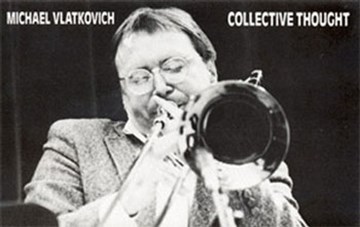
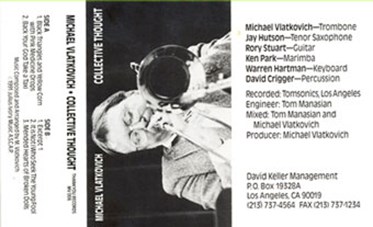
Side A
1. Black Triangles and Yellow Corn with Pink Medicine drops
2. Back Your God Take a Taxi
Side B
1. Excerpt 1
2. It is Not I Who Seek The Young Fool
3. Mended Hearts of Broken Dolls
Personnel
Michael Vlatkovich – trombone / compositions
Jay Hutson - tenor saxophone
Rory Stuart - guitar
Ken Park - marimba
Warren Hartman - keyboard
David Crigger – percussion
Recorded: Tomsonics, Los Angeles
Engineer: Tom Manasian
Mixed by Tom Manasian and Michael Vlatkovich
Produced by Michael Vlatkovich
Music composed and arranged by Michael Vlatkovich (1991, Julius Ivory Music, ASCAP)
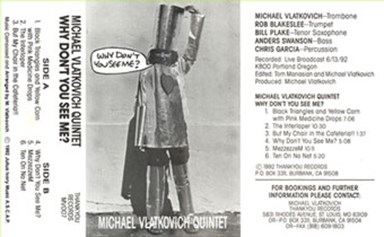
Side A
1. Black Triangles and Yellow Corn with Pink Medicine drops
2. The Interloper
3. But My Chair In The Cafetaria
Side B
1. Why Don’t You See Me?
2. Mezzezzem
3. Ten On No Net
Personnel
Michael Vlatkovich – trombone / compositions
Rob Blakeslee – trumpet
Bill Plake - tenor saxophone
Anders Swanson – bass
Chris Garcia – percussion
Recorded live broadcast KBOO Portland Oregon
Edited by Tom Manasian and Michael Vlatkovich
Produced by Michael Vlatkovich
Music composed and arranged by Michael Vlatkovich (1992, Julius Ivory Music, ASCAP)
REVIEWS:
"...Why Don't You See Me? with its blustery, swaggering and bluesy Mingus-like rag-tag amalgam of structure (including interesting support material for the soloists) and open-ended improvisation, is of even greater import. Buoyed by periodic rock rhythm underpinning which, amazingly enough, avoids any concession to fusion or pop, and odd striking percussion textures, it’s a sprawling spirited freewheeling set."
Cadence, Vol 19 No 9
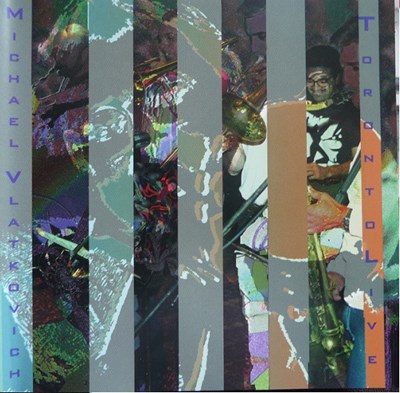
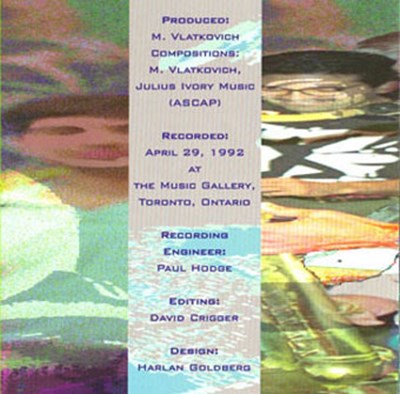
This CD documents a music Gallery concert of the Michael Vlatkovich Quartet, performed April 29, 1992, in Toronto as part a national tour. We were very pleased to include special guests David Mott, baritone saxophone and Tom Walsh, trombone for this particular concert.
Tracklist:
1. Red Leather Yellow Leather ... Red Leather Yellow Leather
2. (Medley) A3BFGI3Nor2ST4/ Anelim
3. Why Don't You See Me?
4. (Medley) Ten On No Net/ Maybe Another Time/ 5808085
5. Walzer Tanzen
6. 27529
Personnel
Michael Vlatkovich – trombone / composition / percussion
Tom Walsh – trombone / percussion
Bill Plake - tenor saxophone
David Mott - baritone saxophone
Anders Swanson - bass
Chris Garcia - percussion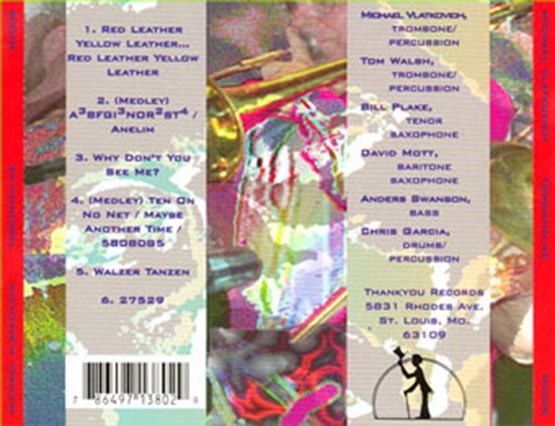
REVIEWS
"No.8 in Kirk Silsbee's Favorite Local Jazz Albums of 1999."
LA New Times
"Whoever said that the saxophone most closely resembles the human voice probably never heard Michael Vlatkovich’s trombone. Actually Vlatkovich sounds a lot like my uncle Rocco. He always sounded a bit tipsy, even when he wasn’t drinking. When Rocco enters a room, everyone knows it, Blap, Fwap everyone’s happy. When Vlatkovich speaks, er sings, it’s the same cavorting scale. For this live date saxophonist David Mott and trombonist Tom Walsh augmented his quartet. The music is part Rahsaan Roland Kirk whirling circus and part Charles Mingus workshop. Meaning the compositions are open-ended and the improvisations are soulful. Vlatkovich knows something about structured improvisation, being a frequent collaborator on Los Angeles based Vinny Golia’s projects including his famed Large Ensembles. Vlatkovich’s concepts start with the very aggressive Elvin Jones-muscular beat of drummer Chris Garcia. From this foundation, the piano-less band shifts pattern and time, not in sharp angles but sure-footed movements. They hop from blues to tangos and marches, all the time the trombones are vocalizing, articulating, and encouraging discourse. The bones bring out the voices of the saxophones. Bill Plake and Mott join in. A squeak here, repeated honks there, all add to the summit. Vlatkovich reminds me of a West Coast version of Tim Berne’s Bloodcount because the emphasis is placed upon group improvisation and non-traditional forms of music structure. All this in what I find to be very accessible music of the avant-garde. This disc is surely to be on my top ten releases of the year."
Mark Corroto, August 01, 2000
http://www.allaboutjazz.com/php/article.php?id=6064
"Vlatkovich's session emphasizes the leader's compositions. It is a live session that integrates guest artists into the context of a working group. The guests - baritone saxophonist David Matt and trombonist Tom Walsh - fit into the session so well, even given the intricacy of some of the compositions, you'd think they were regulars. This blend of eclectic compositional structures and wide open blowing usually gets tagged as Mingus-influenced by reviewers, and certainly there's an element of that here. On the medley starting with "Ten on..." Vlatkovich even includes a creamy faux Ellington trombone ballad that certainly would be at home on a Mingus session. The ensemble, though, achieves its own distinctive sound. This is a scrappy, sprawling affair, at times a raucous circus - the band even launches into a bit of "Hernando's Hideaway" on "Watzter Tanzen." Vlatkovich is the life of the party with broad, boisterous solos that evoke the most serious clowning. Guest David Mott also registers some fine moments, especially on the "Ten on..." medley where he's pushed along by a unison trombone line. But no one lets down... this must have been an absolute gas to hear live. My only quibble is that three of the tracks fade out before their natural endings. The opener and closer both get this kind of musical Kevorkian treatment just as sax players are launching into solos. I realize time and, possibly, musical factors probably made this necessary, but it still bugs me. That, however, is a quibble, and far outbalanced by the high spirits and high quality of the rest of the date."
David Dupont, Cadence, April 2000
"Since Michael Vlatkovich's music often displays a puckish sense of humor, it's not a huge surprise this live date featuring his regular quartet plus guests David Mott and Tom Walsh sports a bottom-heavy lineup of two trombones, tenor and baritone saxes, and bass/drums. Trumpet fans, steer clear--ain't nothin' for you here.
The sextet hit the ground running with the knotty theme of "Red Leather" before Anders Swanson's bass is off to the walking races and Chris Garcia drops bombs behind Vlatkovich's solo. The piece mysteriously fades out (tape problem, maybe?) after four minutes when it's nowhere near done. "A3BFGI3NOR2ST4" opens as abstractly as its title before a theme takes shape incrementally and the trombones create an almost polka feel behind the harmonized saxes' melody. It roams around, changes form and focus, but remains organic in conception, and that's not a bad capsule description of the music throughout Toronto Live.
If Vlatkovich has a model here, it most likely is from the Charles Mingus mode, where both the compositions and improvisations move through various sections. The key is the musicians listening and reacting to each other -- there's relatively little soloist-plus-rhythm section playing here without someone (or everyone) interjecting and developing some kind of contrapuntal supporting theme.
So "Why Don't You See Me?" starts blowsy noir blues that quickly breaks down into pointillist squiggles before setting off on Bill Plake's tenor solo. The "Ten On No Net" medley starts with a bright theme quickly left behind -- this crew doesn't take much time on any of the opening melodies -- to embark on a meandering voyage that encompasses a tempo downshift to launch Swanson into a strong solo and a mellifluous ballad ensemble topped by Vlatkovich's beautifully rounded tone. That's maybe half of what happens in the first half of the medley, which should give an idea about how much goes on within each piece here.
Garcia's punctuations support the sharp, winding, opening melody to "Walzer Tanken," and there's a funky groove working for a while behind a muted Vlatkovich solo on "27529," complete with a few semi-duck quacks. Swanson takes a brief solo, then shifts to arco and drops into a supporting role when the horns enter with pointillist dots.
Mott and Walsh are fully integrated into the music and everyone is in fine form -- Plake's sharp, staccato, tenor runs provide an excellent contrast to Vlatkovich, who's more into post-bop broad melodic blats than bop runs. There's not much more to say except that Toronto Live is full of adventurous, probing music that will keep listeners on their toes as much as Vlatkovich and company undoubtedly were when they created it."
Don Snowden, All Music Guide
"Expressive trombonist. A distinctive compositional approach which strikes a good balance between polyphonic improvising and structure."
KIRK SILSBEE - LA READER
"Vlatkovich is an arresting writer who works with many different forms - numerical compositions, tango, waltzes, big band swingers, and more. He also assembles musicians accomplished enough to interpret his pieces with verve and imagination."
NEW TIMES
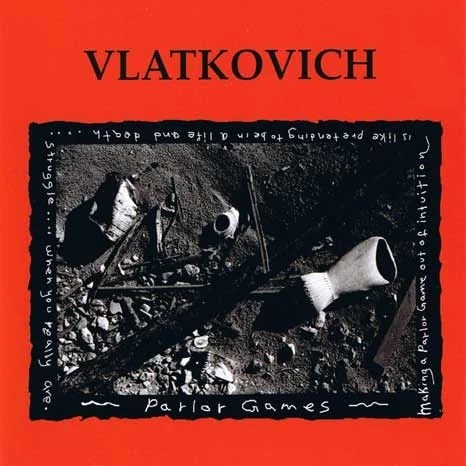
Tracklist:
1. Angeles National Forest
2. The Kissing Song
3. Why Don't You see Me?
4. Anima
5. Mueller Tunnel
6. Parlor Games
7. What World Is This?
8. Were Dogs Drinking Water
9. Bye Bye "D" train
10. Animal Circus Of Snow
All music composed by Michael Vlatkovich, except "Kissing Song" by Warren Hartman
© & ® Julius Ivory Music, ASCAP 2002
All lyrics by Chuck Britt
Produced by Michael Vlatkovich
recorded: Gary Denton Recording, David Crigger Recording, Tomsonics, Gary Bivona (live recording)
Mastering: David Crigger
Art: Chuck Britt
Personnel:
Michael Vlatkovich – trombone/compositions/percussion/voice/piano
Lou Gonzales - trumpet
David Riddles - contra alto clarinet
Jay Hutson – soprano, tenor sax
Michael Jacobson - cello
Harlan Goldberg - drums
Chuck Britt – voice/percussion
Gary Denton – percussion/guitar
Warren Hartman – voice/synthesizer/electric piano
David Crigger – percussion/drums
Dominic Genova - bass
Mark Underwood - trumpet
Ken Park - drums
Vinny Golia – tenor/baritone sax
Bill Masonheimer - tuba
Michael Jacobson - cello
Devorah Juanier - acoustic piano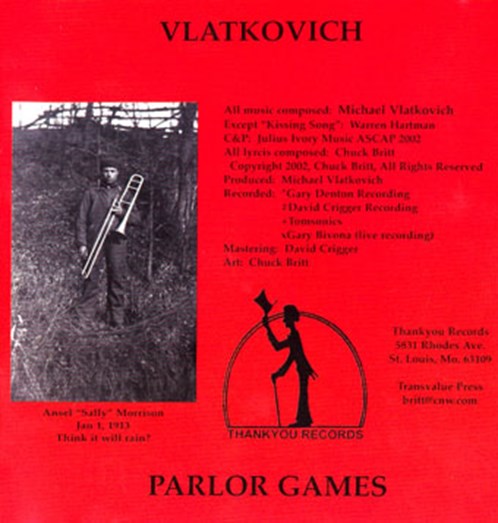
REVIEWS:
"Trombonist Vlatkovich challenges some internal sense of balance with his "Parlor Games". Mostly a large group recording, it feature mixed winds, voice and strings cycling through some composed forms that give an impression of fanfare, as though a postcard of Charles Ives had been glued to Vlatkovich's music stand during the session."
Source of this review not known.
"Journeyman West Coast composer and trombonist Michael Vlatkovich, who over the course of his 20-year career has always been—in the words of help wanted ads—a self-starter, has been particularly busy of late. These two issues (one on his own label Thankyou Records) are the second and third from Vlatkovich’s hand that I’ve reviewed in the past month. All—the other was a trio date on Origin—clearly are the work of the same, fertile musical mind. Yet each demonstrates how flexible Vlatkovich’s muse is.
Parlor Games is a showcase for his compositions. Like his trombone playing, they demonstrate a concern with timbre as well as a stylistic reach that extends from free blowouts to peppy show tunes. The core vocabulary, though, is a kind of modern romanticism, full of evocative turns of phrase and rich harmonies. Even on “Were the Dogs Drinking Water or Was It Roller Skating?” (Vlatkovich has a knack for titles that are at once odd and poetic, yet comic), delivered by a four-piece band, he elicits a vibrant range of colors, using a variety of mutes on his trombone. And on Warren Hartman’s “The Kissing Song”, one wonders why more singer-songwriters don’t employ a percussion and trombone backup band. On most tracks Vlatkovich uses an ensemble of six to eight pieces.
These pieces are compositions, not tunes intended to bookend a round of solos. Vlatkovich is adept at nurturing kernels of melody into fully bloomed compositions. On “Bye Bye ‘D’ Train”, the piece opens with a simple two-note declaration that’s followed by a related four-note lick. The entire eleven and a half minute fantasy grows from those six notes, eventually getting worked into a mariachi fanfare theme. The composer is well served here by soloists Vinny Golia, a regular collaborator, on baritone saxophone, and bassist Dominic Genova as they keep threading those notes through their improvisations. As the solos drift into collective improvisations those themes continue to be reiterated.
The opening “Angeles National Forest” is an atmospheric sound painting. Again Vlatkovich uses a simple rhythmic birdcall of a theme, here setting it against a ground fog of long tones from cello and contra-alto clarinet. The composer calls out “wa-wa!” from the underbrush. The piece builds to an ominous climax. That contra-alto clarinet, played expertly by David Riddles, adds a basso luster to several tracks. Its velvety texture enriches the ensemble’s bottom. That’s especially evident on the cinematic “Why Don’t You See Me”, which opens up with a detective show theme, followed by the evoking of a creaky merry-go-round, finally giving way to a free-form chase scene.
Tenor saxophonist Jay Hutson adds powerful blowing to several tracks, notably the closer “Animal Circus of Snow”. The piece starts with what sounds like a band getting ready to line up for a parade. The brass plays bell tones and arpeggios, while the drums rehearse a marching beat and Hutson wails away on tenor. The seemingly random ensemble suddenly makes a poignant modulation, leading to an unsettled circus rhythm. Hutson serves as the lead voice throughout and, when the massed horns rejoin him after playing unaccompanied, it is as if they were an extension of his horn. Vlatkovich and his rotating team of drummers also underpin the melodic development with shifting rhythms. On “Were Dogs...” David Crigger starts with a funk beat that slips into a reggae groove—such subtleties are characteristic of the joys within Vlatkovich’s compositions."
ONE FINAL NOTE, Jazz & Improvised Music Webzine by David Dupont 15 December 2004
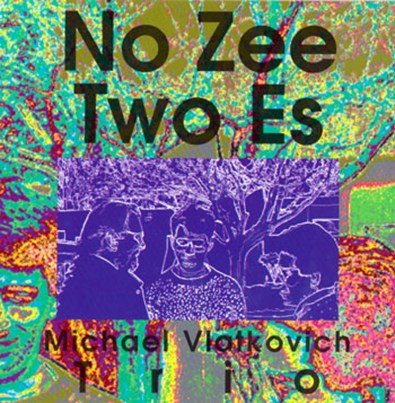
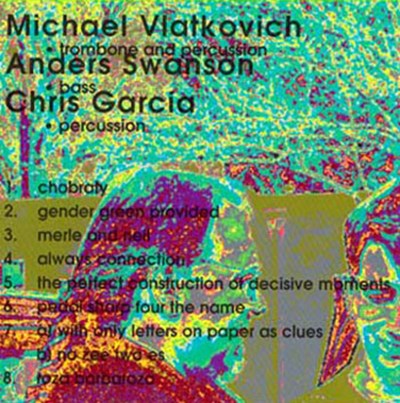
Tracklist:
1. chobarty
2. gender green provided
3. merle and nell
4. always connection
5. the perfect construction of decisiver moments
6. pedal sharp for the name
7. a] with only letters on paper as clues
b] no zee two es
8. rosa barbaroza
Personnel:
Michael Vlatkovich – trombone / percussion
Anders Swanson – bass
Chris Garcia – percussion
Composed and produced by Michael Vlatkovich
© and ℗ 1998 Julius Ivory Music, ASCAP
Recorded at Tomsonics (Jan 8, 1995 and July 10, 1995) by Tom Manassian
Layout by by Jeff Kaiser and Michael Vlatkovich, with Harlan Goldberg
Mastered by David Crigger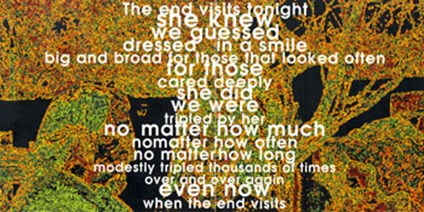
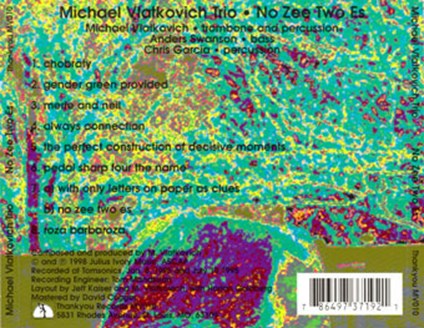
REVIEWS:
"ODD BAR TRIO PLUS TROMBONE Lost Art Cafe (9 Winds) MICHAEL VLATKOVICH TRIO No Zee Two Es (Thank You Records) Both trornbonists John Rapson and Michael Vlatkovich’s respective approaches have qualities that are more often associated with the early jazz trombone than with the smoother-flowing tones of the modern mainstream in which J.J. Johnson serves as a model, despite the progressive nature of the group music reviewed herein. Both Rapson and Vlatkovich were frequently visible on the Southland new music and jazz scene, having been closely associated with avant-garde composer and reedman Vinny Golia. Vlatkovich now resides in Portland, Oregon, and Rapson is presently in charge of Jazz Studies at the University of Iowa after having spent I 0 years (1980-90) as professor of music theory and composition at Westmont College in Santa Barbara, where he founded a jazz studies program, and acquiring a doctorate in ethnomusicology from Wesleyan University in 1993.
Not only is Rapson's style rooted in the past, but he in the company of the Iowa City-based Oddbar Trio- Brcnt Sandy (trumpet, pocket trumpet, flugelhorn), Steve Grismore (guitar), Jim Dreier (drums, percussion)--take a devious trip into it as well, on Lost Art Cafe, by way of the swing classic. "Stompin' at the Savoy"; a homage to Thelonious Monk, "Monk's Mood"; and a soporiferous "A Call of All Demons," by Sun Ra; plus a countrified tune "Ode to Idaho") and a strange mambo ("Beat Cajun Mambo"). There is also a tune remindful in some respects of the vampish funk of Herbie Hancock's 1973 Headhunters album. Among other (oddities, there is even a song having a churchy processional aspect ("July Hymn"). All creatively fascinating by an extraordinary ensemble of musicians. A must for those who have an ear for the unusual.
Where the music of Lost Art Cafe was obviously carefully worked out in advance, that of the Michael Vlatkovich Trio, No Zee Two Es - with locals, Anders Swanson (bass) and Chris Garcia (drums, percussion) was in the main conceived on the spot, relying on a modicum of harmony and defined rhythm while stressing the linearity of melody in a free-associative manner. Therein primarily lies its intrigue, not to ignore the appealingly rich trombone styling that, incidentally, is found in both albums."
Russell Arthur Roberts, LA Jazz Scene, February 2000
"Michael Vlatkovich should be familiar to close readers of this magazine for his earlier well received albums as a leader and for his work with, Vinny Golia. Vlatkovich's style puts him squarely in the post-bop tradition, but he places it in a free framework. Okay, so he's not J.J. Johnson Of George Lewis. But, why should he be? He is Michael Vlatkovich, very much an individualist who has carved a concept uniquely His. Somehow, even with his largely ordinary technique, there is something eerily appealing about the way Michael Vlatkovich plays, the way his personality permeates everything he does. To paraphrase the cliché, Vlatkovich marches to the beat of a different trombonist. His roots and influences are unclear, even though there is nothing revolutionary in his style. The trombonist stresses angular lines punctuated by fat, globular punches.
At first glance, you might miss it, but there is no question that he passionately molds an impressive result through perseverance and grit. The trombonist favors a punctuated rnuted sound that relies as much on highly focused effort as anything else. You cannot help but be sucked into his den, whether on the highly attractive and circus-like "Merle and Neil" or through some of his other charming melodies. The music, all composed by Vlatkovich, has a chamber feel yet it falls firmly in the Jazz camp. Ultimately, it is Vlatkovich's extraordinary concept his special "feel" that holds sway. While he favors slow tempos, he is equally comfortable up-tempo.
The recording is a lesson in how a good, but not extraordinary musician, through targeted and progressive vision, can achieve very special results. Vlatkovich's attractive sound in the mid-to-Iower range of the horn effectively dances over the powerful percussion and bass, which are particularly impressive in tandem when the trombone drops out. Swanson's bass regales in syncopated rhythms, and his solos show a solid sophistication, alternating between arco and pizzicato.
On "Roza Barbaroza," he sounds like an acoustic bass guitar. Chris Garcia's drums complement the bass, and support Vlatkovich effectively. On "Roza” the long interlude of bass and drums is a pleasant addition, while on the preceding piece, Garcia's march-like snare lays a creative backdrop over which the trombone showers winding lines. There are exciting moments throughout this release and some highly creative moments, including the interactive lines of the individual members of the trio, whether improvised or preconceived."
Steven A. Loewy, Cadence, July 2000
"Trombonist lead trios aren't exactly commonplace but then again Michael Vlatkovich isn't your average trombonist. He squeaks, soars, and sears and tears sonic pieces of paper much like a saxophonist. More than once my lazy ears have wondered if a saxophone was in fact what Vlatkovich was playing bur further studies have long revealed that the extended physical length and negotiation that goes along with the trombone is also part of his sound. He has added greatly to sessions lead by Rob Blakeslee and Vinny Golia and has begun to build a reputation as a fine leader and composer. Quite simply, and with all due respect to players like Jed Bishop, Joe Fiedler, Masahiko Kono, Steve Swell, and even my all time favorite Roswell Rudd, Vlatkovich is the finest trombonist improvising today.
No Zee Two Es finds Vlatkovich in the company of his regular associates drummer Chris Garcia and bassist Anders Swanson in sessions from January 8 and July 10 of 1995. The eight tracks and over 60 minutes of music varies between swing and stammer and yet do not sacrifice much in the way of instrumental complexity. Much of the disc consists of a breezy trombone eeking out the blues while a rhythm succeeds in finding a way to play beneath the surface. Swanson, in particular breaks out with some great spacey lyrical playing on cuts like "chobraty" and "merle and nell."
While this music isn't exactly "out there," it is far from the "mainstream." There isn't a "blow out" or antagonistic section on this disc and yet all of the cuts have a smidgen of unpredictability that makes them challenging. "always connection," for instance, opens with a bright solo by Vlatkovich and continues on a path that would likely lull more adventurous to sleep if it wasn't for the looseness of Garcia and Swanson. Vlatkovich gets credit for writing all of the pieces though it remains unclear how much composition was involved in producing the music. I can imagine how these sounds came about through loose scores but then again I could see similar sounds coming from fully improvised date.
In the end, it doesn't matter as this music shines in or outside of any context. Fans of Jemeel Moondoc and other neo-free-boppers, such as the previously mentioned Rob Blakeslee, are sure to enjoy No Zee Two Es as is just about anybody with an ear for great playing and improvisation."
Lee Prosser jazzreview.com (site not up)
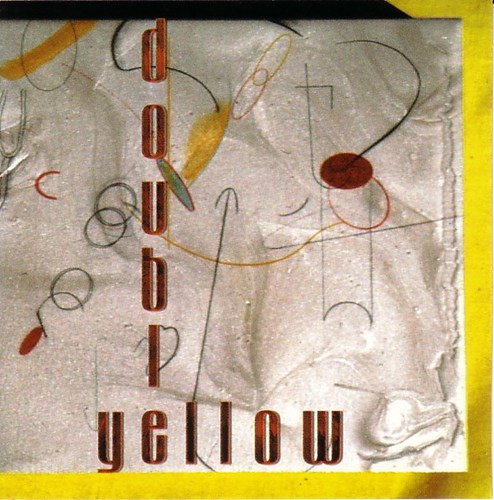
Tracklist:
1 The Admiral Remembers Wild Times On The Isthmus
2 Lamentations and Dirge Of The Huskies
3 Convergence
4 Abandon The Ink
5 Aurora Borealis
6 Ice Floe
7 Guardians
8 Sentrys
9 90º Latitude
Personnel:
Rob Blakeslee – trumpet / flugelhorn
Michael Vlatkovich – trombone / claps
William Roper – tuba / conch / voice, wine glasses, gong
Brad Dutz - a lot of percussion
Recorded live June 25 1999, Apperson St. Studio
Engineered and mixed by Brad Dutz
Edited by Michael Vlatkovich
Mastered by Wayne Peet at Newzone Studio
REVIEWS:
“For all the little instruments (some of which whose names are indecipherable due to unusual type), the main focus of Double Yellow is with the horns. Many will recognize the label, ThankYou Records, as a vehicle for Michael Vlatkovich, a freestyle trombonist who never fits any molds. Here, he plays with a quartet that features individual and collective improvisations around usually laconic tempos and sparse densities. With all the potential diversity due to the varied instruments, often only a couple of players go at it at once, and the trombone. trumpet, and tuba share honors with what sounds like, at various times, vibes, percussive elements, and flute-like tones.
Trumpeter Rob Blakeslee is given room to explore in his characteristically lyrical way. Actually, much of the music is melodious, though not of any particular melody. Bill Roper lays down some lovely lines on tuba on "Aurora Borealis," backed by Brad Dutz on various little instruments. Michael Vlatkovich toots his bone throughout, with a clear, ringing sound, but he is also constrained by the arrangements. The trombonist shows a more restrained side here than usual, as the ambiance is not designed to display virtuosity. Instead, the individual contributions are very much subordinated to the sound of the collective. The pace rarely quickens, and yet there is fascinating interplay that requires close listening. Less compelling, perhaps, than other recordings by some of these performers, including Vlatkovich, it is still important and intriguing for the different perspectives it shows.”
Steven Loewy, Cadence - November 2000
"Double Yellow, Rob Blakeslee, tpt, flgl; Michael Vlatkovich, trb and claps; William Roper, tuba, conch, voice, wine glasses, gong; Brad Dutz, a lot of percussion. THANKYOU Records
What a formidable lineup. Each a solid leader in their own right, as an ensemble they improvise as a unit: What could have been a session to see who could outblow the other, instead becomes a delightful study in interplay. From the opening squeeks and slapped mouthpieces to the closing concertina with brass counterpoint, this is a collection of great improvs that will bear repeated listenings. Birdcalls, trumpeting tuba, harmon (plunger?) trombone, fluttering trumpet interrupted by splashes of percussion, trombone quoting Gershwin behind a groove of shakers·and that is just one track (Ice Flow)·
Though the music has a serious face, humor is always slinking about..., waiting to erupt in some grotesquely funny way. Double Yellow, a new CD featuring the band by the same name, presents a series of free improvisations by Portland based artists Rob Blakeslee on trumpet, flugelhorn & misc., Michael Vlatkovich on trombone and misc., along with Los Angeles based Brad Dutz on innumerable percussion & concertina, plus William Roper on tuba, percussion, voice, bovine horns and shells. From this somewhat traditional combination of instruments emerges an unusual music of arresting timbres, intelligence, wit and intensity.
"...[Double Yellow is]fascinating spur-of-the moment chatting going on simultaneously here between four real characters, yet none trying to out shout the other."
"...Moreover, you'll find its real beauty runs deep, far more than a collection of aural artifices. If you are not hidebound by the notion that music must be steeped in tradition, then Double Yellow deserves your ears.""
Russell Arthur Roberts, L.A. Jazz Scene, November 2000
"Double Yellow is a 1999 recording featuring Roper performing alongside some venerable West Coast modern jazz musicians. Here, percussion wunderkind Brad Dutz utilizes an arsenal consisting of gongs, cymbals, tablas, chimes and more as trumpeter Rob Blakeslee and trombonist Michael Vlatkovich mince accenting tonalities, with poignant interludes, modern jazz interplay and world beat grooves. Moreover, the band also partakes in sonorous extended note drones, subtly climactic passages, oscillating crosscurrents and indigenous rhythms. Basically, the musicians’ pursue some sort of transcendental aura in conjunction with their largely unclassifiable methodologies and cascading soundscapes. Double Yellow brims with contrasting notions intermingled into a rather quixotic presentation, although a sense of mystery tends to hover atop the proceedings as though the listener might be sequestered in a sacred ruin during the still of night. While it will not be suggested that the band is serving up a religious mantra, the music, whether vibrantly performed or quietly mystifying, rings of power and substance. Recommended."
Glen Astarita http://www.allaboutjazz.com/
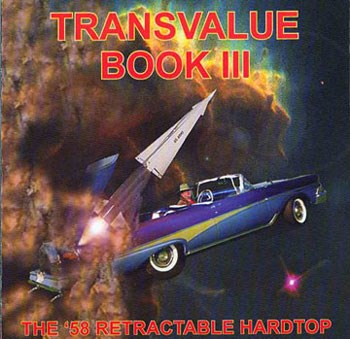
Tracklist:
1. Not Knowing (Britt/Vlatkovich)
Vinny Golia - Piccolo Solo / David Crigger - Organ, Castanets
2. The ‘58 Retractable Hardtop (Britt/Vlatkovich)
Lou Gonzales - Trpt. Solo • Michael Vlatkovich - Trmb. Solo / Jay Hutson - Alto Solo / Glen Horiuchi - Piano Solo / Vinny Golia - Piccolo Solo / Mark Underwood - Trpt Solo / Melanie Crachiolo & Chuck Sabatino – Vocals / Devora Block, Danny Block, Aaron Britt, David Crigger, Larkin Higgens, Milena Miller, Alison Pipitone & Damon Pipitone - Additional Vocals / David Crigger - Organ, SFX, Loops & Add. Keys
3. I Have These Tears (Britt/Vlatkovich)
Bill Plake - Tenor / Michael Vlatkovich – Trombone / Chuck Britt – Hummingbird
4. Frances’ Cheeks (Britt/Vlatkovich)
Glen Horiuchi - Piano / Jay Hutson – Alto / Melanie Crachiolo & Chuck Sabatino – Vocals
5. Wars For The Numb (01-21-91) (Britt/Vlatkovich)
Dominic Genova – Bass / David Crigger - Ethnic Drumset & “Taiko” Ensemble
6. Wedding Song (Britt/Vlatkovich)
Melanie Crachiolo & Chuck Sabatino – Vocals / Vinny Golia - Baritone Solo / Warren Hartman – Keyboards / Mike Turner - Congas / David Crigger - Add. Keyboards / Warren Hartman, Larkin Higgens, Milena Miller & Michael Vlatkovich - Additional Vocals
7. The Father (Britt/Vlatkovich)
Bill Plake - Tenor / Michael Vlatkovich – Trombone / Jeanette Wrate – Drums
8. Of Dancers (Britt/Vlatkovich)
Bill Plake - Tenor Solo / Glen Horiuchi - Piano Solo / Mark Underwood - Trmpet Solo / Mike Turner – Congas / David Crigger - Organ, Rhodes
9. For Alec From Pappy (Britt/Crigger)
Jeanette Wrate - Drumset Source Performance / David Crigger - Extreme Sonic Manipulation
10. The New Day (Britt/Vlatkovich)
Jay Hutson - Alto Solo / Bill Plake - Flute Solo / George McMullen - Trombone Solo
11. The Kissing Song (Britt/Hartman)
Warren Hartman - Piano, Keyboards / Matt Cooker - Cello / Jay Hutson – Alto / Michael Vlatkovich – Trombone / David Crigger - Bass, Additional Keyboards
Personnel
Chuck Britt - poems / vocals
Michael Vlatkovich – trombone
David Crigger - percussion / effects
Matt Cooker – cello
Dominic Genova – bass
Vinny Golia – woodwinds
Lou Gonzales – trumpet
Warren Hartman – keyboard
Glen Horiuchi – piano
Jay Hutson – woodwinds
George McMullen – trombone
Bill Plake – woodwinds
Bill Roper – tuba
Mike Turner – conga
Mark Underwood – trumpet
Jeanette Wrate – percussion
Devora Block / Danny Block / Aaron Britt /Melanie Crachiolo /Larkin Higgens /
Milena Miller / Alison Pipitone / Damon Pipitone / Damon Pipitone / Chuck Sabatino - vocals
Produced by Chuck Britt, Michael Vlatkovich & David Crigger
Recorded and Mixed by David Crigger
Art by Chuck Britt
Mastered by Rob Shrock and David Crigger
All Words by Chuck Britt
All Music by Michael Vlatkovich – except “The Kissing Song” by Warren Hartman &
“For Alec From Pappy” by David Crigger
Copyright ©2007 All Rights Reserved
Transvalue Book III is dedicated in loving memory to: Glen Horiuchi, Chuck Sabatino and Mike Turner
The '58 Retractable Hardtop
Chuck and his friends can make a quick trip to the past, visit his childhood home, and never leave their present orbit...
Take a trio in the best beat- poetry tradition, - a storyteller, a jazz trombonist and a drummer -- with all of its promise of interaction, communication and “in the moment” interplay... Now expand it -- more players, more voices; broader drama, wilder expressions; while losing none of its spirit and spontaneity and you have Transvalue -- an ongoing exploration of the inner depths of human interaction and the outer reaches of jazz... and where both come together as one.
Since 1980 under the name, TRANSVALUE, trombonist/composer Michael Vlatkovich has been, with his unique brand of improvisationally-friendly compositions, creating musical settings to support, surround and interact with the writings and vocal performances of spoken word artist Chuck Britt. The third integral component of this repertory company has been drummer/percussionist, David Crigger. His role as recording engineer/mixer has grown beyond mere capturing of performances to include editing, shaping and extending those performances to match Transvalue’s current vision of itself. Transvalue has now grown into a repertory company of experimental jazz artists with the instrumentation varying with the needs of the material.
REVIEWS:
"Book III selected among the top 15 CDs of the first half of 2008.”
Francois Couture, Reviewer, journalist, producer of Delire Musical/Delire Actuel (CFLX)
"Absolutely amazing compositions in a truly timeless unique style. Book III is truly a classic! It's great to hear musicians who keep the integrity to their own voice."
Bruno & Peggy Kicks, Extreme Radio @ Radio Centraal (Antwerp, Belgium)
"There's something about Charles Morrison Britt. Whether or I not you enjoy his straightforward poetry and gruff and gravely speaking voice, you cannot deny his powerful presence. Although he is backed by a large musical ensemble, with outstanding West Coast musicians including luminaries Michael Vlatkovich, Vinny Golia, Glen Horiuchi, and Bill Roper, this is Britt's gig, and his presence dominates. That said, there are some very good solos interspersed throughout, and Vlatkovich's compositions and arrangements are uniformly superb, with a twisted Swing feel and many will eagerly await the trombonist's big band album (hopefully, sans voice). You might even call this one Anthony Braxton meets Philip Dick meets Gregory Corso. Vlatkovich layers sounds and mixes genres, in what is arguably his best writing on disc. He interweaves soloists with quirky melodies and twisted lines that are original though ensconced in the big band tradition. This works particularly well on "Francis Cheeks," where the piece cradles high-energy solos by the late pianist Glen Horiuchi and saxophonist Jay Hutson. Vlatkovich impresses, too, as a performer, taking solos on several pieces. Britt writes and speaks of feelings, and, as with any good poet, he utters truths about life and death. He has thought about what is important and he often hits the mark. While some are likely to find his delivery tiresome by the final track, there is no denying its serious heartfelt messages, even with a warped sense of humor and sometimes exaggerated delivery. Speaking in the vernacular, Britt's roots might be traced to the Beats, but Britt is less angry and more responsible, even if not less radical. (Three name corrections made.)"
Steven Loewy© Cadence Magazine 2008 Oct-Nov-Dec 2008
"Transvalue are an amalgamation of talking turmoil and spectacular arrangements, existing since 1980. Its core members are trombonist and composer Michael Vlatkovich, spoken word artist Chuck Britt and percussionist David Crigger; the circle of aides for this CD encompasses a lot of terrific musicians, Vinny Golia being a name that was immediately recognized here. The record is quite long at over 76 minutes, and listening to a somewhat belligerent voice speaking for long stretches may be demanding sometimes - especially for the non-well versed in the English idiom - but boy, can these guys play. There’s not a note out of position, and after a while one even manages to become au fait with Britt’s not-instantly-gratifying rasping tone, which is more or less ever present (although not at all times in a nonstop manner: there are also duets - and lots of beautiful ensemble singing, too). The orchestrations called to memory several beloved entities of mine: Zappa (circa “Greggery Peccary” and “The Grand Wazoo”) on top of everything, The Tubes, British jazz (a number of sections reminded me, in short tracts, of Kenny Wheeler), the whole typified both by drama and thrilled outbursts - exactly as in an archetypal musical. The technical altitude remains persistently remarkable, the eminence of the instrumentalists triumphing upon any potential defect (and I didn’t find so many indeed). My foot was often caught tapping when listening to this. Give these chaps an opportunity: although not really devising anything new, they just sound gorgeous."
Massimo Ricci, Rome, Italy
www.touchingextremes.org
"Chuck Britt, Michael Vlatkovich, David Crigger, Vinny Golia, etc. ...
This is a hurricane and you fall on rubble with the first notes of Transvalue Book III. The thunderous voice of Chuck Britt and the power of his words are supported by a big band playing Michael Vlatkovich’s score which is capable of constant change without losing any of the momentum that physically moves you. A mad embrace of life prevails. The voice and orchestra are tight and without economy, shamelessly and with pleasure unpacking and removing intimate memories that could be embarrassing (text and music are available on the Transvalue site at: http://www.transvalue.info). It is all purely American without doubt, all the more because he is an eastern American on the west coast and he comes in a car. I am listening to this CD for the nth time, and I can’t stop listening to write. I am struck by the words that escape from the voice of Chuck Britt, and the whirlwind of Vlatkovich. The solos are up to the rest. This once in a lifetime machine, is fuelled and at maximum power searching out our violence and tenderness with deadly accuracy."
Noel Tachet (Translated by with help from Google CMB)
http://tfjhp.blogspot.com/
"What is this? A poem cycle in big band jazz cloths? Affinities: Zappa, Yellow Shark? The cabaret-punk orchestra, World / Inferno Friendship Society? City of Mirrors, Motor Totemist Guild? Woodwinds four (including Vinny Golia), four Brass, Bass (Domenic Genova), piano, chorus, this is big! David Crigger on drums, organ & Electronics, and also for recording and mixing. Most compositions are by the trombonist & Thankyou Records label artist, Michael Pierre Vlatkovich, a fixture on the West Coast, especially in the Vinny Golia Large Ensemble and Jeff Kaiser Octet. The libretto comes from Chuck Britt, his poetry is recited in sing-speech style. The TRANSVALUE collaboration has been in place since 1980. Book I appeared in 1985, and in 1988 Book II followed (Teapot in a Tempest). In Book III, Britt’s memories lead us back to his early years in Ohio: The ’58 Retractable Hardtop “I sit in the '58 retractable hard top (parked in the side yard) / It opens up and down like a Nike silo / But I don’t feel safe ... I feel embarrassed / As I wait for Father / Up and down / Playing the radio all the time / Wishing for a "normal" adolescence / American Bandstand girls and buddies to teach me about sex”. The dominant father casts his shadow. I Have These Tears is also pervaded by childhood fears, insecurity and salty tracks. With Wars for the Numb (01-21-91) and Wedding Song Britt makes the transition away from the family front: “Eons of fear and voiceless estrangement / Eons of coercion, violation and destruction/ Hopeless and waste hidden behind racial, regional and national chauvinism”, to politics: “Oh War, please entertain us / Keep us numb, we pray / If you abandon us / Our pain will be upon us ... “. But Britt also makes the next leap in The Kissing Song (Composition by Warren Hartman) beyond his father, to say yes to the course of events and fall in love, even if only like a dog chasing its own tail. Britt is not a formalist; he wears his heart on the tongue. The stories are much more than an ego trip, in fact they inspire the great music of TRANSVALUE, like the tango, Not Knowing with it’s circus music and Ultra Lounge brass arrangement that gives one the arm around the waist and the tongue-in-the-cheek, Britt’s emotions brush against the grain, with his grating presentation itself the yeast steering us in the opposite direction.
Here we have my echo to your fine poetry & music."
Rigobert Dittmann, Bad Alchemy, Franz-Ludwig-Str.11 97072 Würzburg (Translated by with help from Google CMB)
"Another out of the blue - Transvalue are Chuck Britt (vocals) Michael Vlatkovich (trombone, composition) and David Crigger (drums, electronics) with an extensive cast of supporters on instruments and vocals. As the title implies, this is the third release, out on thank you records.
And if you get this it is worth going to the site - because one center of this album is the words: Britt is beat-influenced flamboyant wordsmith and reciter. These are complex dramatic amusing and evocative poems put to music, and delivered musically (not a spoken-word album). There are choruses and hooks to his lyrics, they are rich in detail metaphor and humanity, and drive the album forward. In many pieces, as a good performance poet, there are repeated elements of words (such as now in Not knowing, or Yes in For Alec from Pappy or structural elements such as the ten-year steps of The father or the memory returns of The new day) that offer pace and focus. Themes include relationships, politics, remembrance that are specific and universal.
But there is also the music created by Vlatkovich. This varies from relatively straightforward big-band jazz in Of dancers or The new day, a tango of Not knowing, or the nostalgic piano and alto of Frances' cheeks, in all of which there are extensive solos like the piano and then trumpet that plays while they dance to the flute and drum in The new day. In The father the music follows the lines of the song, while in Wars for the numb (02-21-91) there is a dense bed of percussive processing that suits the song and For Alec from Pappy has a similar but less dark soundscape. The music combines careful and sympathetic writing with the freedom to improvise.
There are two extended tracks - the ostensible title track is a lovely development of a father/son theme that traverses 50s doowop, faster group work, choruses and a final reflective coda: a wild ride in the hardtop indeed, Wedding song - which opens 'The horror/Only survivors made us/Eons of fear and voiceless estrangement/Eons of coercion, violation and destruction/No one knew' is the most complex lyrically - the poem appears to be an epithalamion which balances the despair and fear with the hope which is represented by love and family. The music reflects this complexity, a pastoral opening is undone by the lyrics and then includes operatic/chorale elements with additional voices and slipping through a variety of styles. I am not sure that it is 100% effective but it is absorbing.
And then, to end the album, comes a further surprise - pianist Hartman wrote the music for The kissing song, a gentle piece with a yearning cello line through that offers a final reflective passage, underscored by Britt's vocals - and I mean vocals. To this point he has been gruff spoken/recitative but here he sings with a mellow croonerish 50s tone that swings the album in a different direction, ending on a subtle note.
The three (old) geezers on the cover of this album, the cheesy colors and layout of it and the site, belie an album of breadth, musicality and sophistication which is a surprise and delight."
AMPERSAND ETCETERA Posted by: Jeremy Keens, Mount Macedon, Victoria, Australia
http://ampersandetc.blogspot.com/2008/06/transvalue-book-iii-58-retractable.html
"In TRANSVALUE BOOK III David Crigger, Chuck Britt and Michael Vlatkovich created the third part of the TRANSVALUE saga. The CD is subtitled, “The ’ 58 Retractable Hardtop”, and is released by Thankyou Records through Transvalue Press. This production links poetry (spoken word) and music of many types: jazz, pop, funk, music of the cinema, the circus, the casino, serious classical music, cabaret crooning, and the familiar sounds of life and very much more. The poetry, which covers subjects like sex, morality and transcendence, is in the best tradition of the beat poets. Chuck Britt recites with a flexible voice and great timing. He is able to reach many registers and accents in each line with the necessary quantum of emotion to create the intended effect.
The basic trio is reinforced and expanded substantially with the addition of notable members of the North American improvisational and experimental music community including: Dominic Genova (bass), Glenn Horiuchi (piano), Vinny Golia, Jay Hutson and Bill Plake (sax), Lou Gonzales and Mark Underwood (trumpets), George McMullen (trombone), William Roper (tuba), Melanie Cracchiolo and Chuck Sabatino (vocals), Warren Hartman (keyboards), Mike Turner (congas), Matt Cooker (violin), Jeanette Wrate (percussion).
With a feel of the 70's, this disc was produced with the same pleasure and impudence what Frank Zappa put into his best productions of that time. Lush arrangements are built up and become almost conventional but soon they are shredded and re-sewn into truly new clothing.
The feminine voices are another strong component in this multifaceted universe of colors, tastes and ideas. Flashy and noisy, technically competent and flooding with creative ideas, this is a simple, spontaneous, witty and serious adventure into megalomania. Book III is worth the effort and the time."
Posted by Eduardo Chagas @ 23.4.08 Oeiras, Portugal (Translated from Portuguese with help from Google)
http://jazzearredores.blogspot.com/search?q=Transvalue
"For nearly three decades, Michael Vlatkovich (trombonist and composer), Chuck Britt (poet and performer), David Crigger (drummer and sound designer) have united their inventiveness to produce trance instrumentals and vocals in line with Tom Waits, Mark Twain, Charles Bukowski and Anthony Braxton. TRANSVALUE is a pleasant but strange salad/sound/creation and the taste of shinning verbs spanning all styles. Some hear Captain Beefheart on a Rabelais horse. Others notice very troubling affinities with the world of Zappa: doo wop rubs funk with a brass deluge. This album is the third part of a trilogy in which the trio, brims with energy and is more than convincing. The speaking voice of Chuck Britt, grating and cavernous, perches above a vast body of instruments sounding like a film score of horrors and farces. Funny, carnival improvisation, musical or noisy citations, pharaonic arrangements resulting in a muscular journey. At 18, David Crigger debuted in the orchestra of Don Ellis and then he accompanied Brian Auger and George Duke before joining Burt Bacharach. His bizarre electronic quirks are important to the whole. Michael Vlatkovich moves with a strange (which means absolute originality) security that ricochets sometimes between waltz and tango, sometimes reminding us of Kinderszenen by Robert Schumann. This kind of writing enters the head of the listener and never leaves. He must have seen 200 Motels, the film from the Mack Sennett psyches of Frank Zappa and Tony Palmer, to grasp the possibilities and give birth to this delicious and frilly sound."
Guy Darol, Metropolis, A blog and online-shop for jazz, improvised and ‘unheard’ music (Translation with help from Google CMB)
http://www.m-etropolis.com/wordpress/?language=en
"Inversion of all values. The nietzschéens of Transvalue are three (Michalel Vlatkovitch, Chuck Britt, David Crigger) and sound like twenty-five. This is the approximate number of soldiers present on this album, the third opus delivering battle against music standard. A beat poetry trio led by the spoken word artist Chuck Britt. That means (open hatches and large quinquets) that the eleven tracks on this gem run simultaneously and in turn the world of Mark Twain and Anthony Braxton, Richard Brautigan and Frank Zappa, Charles Bukowski and Charles Ives. But it should still include Captain Beefheart, George Duke, Ornette Coleman, Duke Ellington, Federico Fellini, Roy Rowland, Astor Piazzola. You follow? Your work monumental juicy, ocean zoroastrale."
Guy Darol, Agitateur Conseil (Translated from French with help from Google CMB)
http://www.guydarol.fr/archive/2008/06/20/transvalue.html
Note: I think when Guy mentions “nietzschéens” and “zoroastrale” he is referring to Friedrich Nietzsche who talks about the Transvaluation of Values in his philosophy (from which our group filched the name TRANSVALUE) and in Nietzsche’s famous book Thus Spoke Zarathustra which refers to Zoroaster the Persian prophet and religious poet.
"I just received your truly interesting CD, TRANSVALUE BOOK lll. I usually check out bits of cuts, I have my earphones on!!! I am the dj for THE LATEST SCORE on WOMR FM in Provincetown, Ma and streaming at WOMR.org I play new art music and everything that rubs up against it. You’re rubbing a groove! I notice your listed under ROCK but I haven't heard that yet. It sounds like new art music to me! Every time I play from this album I will email you the particulars."
Canary Burton, Wellfleet, Ma - WOMR.org streaming 24/7
"I just want to say thanks so much for sending WPVM a copy of the new Transvalue CD. It is definitely up our alley in terms of the progressive, thought-provoking jazz that we love to play."
Jonathan Price WPVM Jazz Director, Ashville, NC, USA
www.wpvm.org
"Thanks for the transvalue BOOK III '58 retractable hardtop. I have been playing it in our studio for most of the week + played it on my shot on WTUL this morning. Again, thanks. Will keep playing it - for sure."
David Gregor W T U L FM 91.5 New Orleans Louisiana
"I really enjoyed the new CD. Even better than the last one I'd say. It harkens to some of the great iconoclasts like John Trubee, Carla Bley's JCOA period, and even Zappa. Excellent work and I look forward to airing ASAP."
Don Campau - No Pigeonholes broadcasts your music in three different ways.
FM Radio> KKUP, 91.5 FM in Cupertino, California broadcasts live to the San Francisco and Monterey Bay Areas twice a month. The second and fourth Sundays 3-5 PM
www.kkup.com
"Thank you for sending me a copy of your latest disc Transvalue III. It's great and I will start playing it on air as of next week on The Spice of Life, one of two shows I have here in Sydney. Just out of curiosity, how did you find out about my show (assuming you sent me the disc)? After having digested in greater detail what you have sent me I would like to do an interview at some stage. Regards, thanks again and best wishes from the real land of Oz."
Hans Stoeve - Powerspot (not just a world music show) - Sydney Australia
www.2ser.com
"I received your Book III this morning, it is full of blood and knowledge, a friendly hurricane! I will send you the review (in French) I will write for Improjazz."
Noël Tachet, Saint-Hilaire Saint Florent, Saumur, France
"TRANSVALUE: Book III – The ’58 Retractable Hardtop Thankyou, 2008
Gonzo mix of beat poetry and avant-garde jazz out of LA, with some great players. Chuck Britt growls out humorous, angry or philosophical poems (many about family or crises of the self) with gusto, and the band is all over the place. There’s more than a touch of Frank Zappa in here... it’s weird and wild and wonderful, how can you not love it? Simply awesome. Fo’s Picks: 1, 2, 4, 5, 8, 10"
Reviewed 2008-06-14 KZSU, Stanford California, ZOOKEEPER ONLINE
http://zookeeper.stanford.edu/index.php?s=byAlbumKey&n=869687&q=10&action=search&session=
"It is a very strange creature that held together somehow by Vlatkovich and the histrionic Chuck Britt and do not underestimate the role of technical and multi-instrumentalist Crigger, who at eighteen sounded the drums for Don Ellis! These three recruited many talented shift workers of pop, soul, hip hop, film and TV, experimenters and jazz musicians.
With a long interval between studio performances in the nineties and this release; recorded in one decade... produced and released in the next. So much time went by that this CD is dedicated to the memory of participants: Sabatino, Horiuchi and Turner who died in 1996 and 2000.
The music is so overflowing with situations, inventions, surprises, lapels and affinities (from Zappa to Carla Bley, with and without Paul Haines, and then the circus, cabaret, latin rhythms, overlapping melodies, moods and loves) that you don’t want to miss the savory recitatives, the polemic and the too rare sung parts, all very tasty."
Alessandro Achilli Musica Jazz viale Sarca 235 20126 Milano
http://it.wikipedia.org/wiki/Musica_Jazz
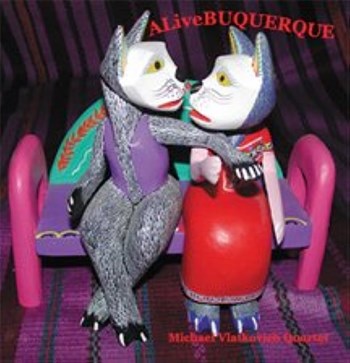
Tracklist:
1. The Blue Robes
2. Once In A Blue Moon A Decent Wolf Comes Along
3. Blue Fragments
4. Black Triangles, Yellow Corn, And Pink Medicine Drops
5. Every Second Of Every Minute Of Every Hour
Personnel
Christopher Garcia – drums / percussion
Jonathan Golove – electric cello
David Mott – baritone saxophone
Michael Vlatkovich – trombone / percussion
Recorded in concert - Outpost Performance Space, May 19, 2003
Recorded and mixed - Manuel Rettinger
Edited and mastered- Wayne Peet
Sculpture artist - Justo Xuana
Photos of sculpture - William Roper
All other photos - Mark Weber
Graphic design - Chuck Britt
"Surely we have arrived Nefertiti. Such luminescence. Our audience brings us forward, carrying our transcendence. Our fate. This music like mercury silver hot upon the wheel cycles out tentacled delicate flux rotating matter, solar, Nebraska, consonance in this tangential place ye shall know as New Mexico. How many years has this composer borne such honesty? The river it flows upon is specific. Yet nothing about it holds the musicians down. There is chance, and probability, and negotiation, and a compass in case anybody wants to look. The delta can be treacherous at certain times of the year. O Nefertiti how calm you are in the center of this music.
18june03
mark weber
Albuquerque
REVIEWS:
"ALiveBUQUERQUE belongs to the listening-for-myself category. It's a spirited set recorded live at the Output Performance Space, Albuquerque, in 2003. This is a potent lineup of avant-improv compositions played by a worthy cast. Mr. Vlatkovich and David Mott, on trombone and baritone sax, respectively, provide a nicely dark, deep-toned two-horn frontline. We've covered David Mott's own interesting work in some depth on these pages and he again shows that attention to your sound as well as the notes themselves, and a thoughtfully structured improvisational sense can distinguish you from the pack. He and Vlatkovich interact on various levels, and they do it in the best interactive traditions of the music. Michael has roots in his playing and they come out most attractively here. There's a generally out context but there is a connection with the past as well.
The electric cello of Jonathan Golove gives another color and a third melodic voice to the ensemble. The pitch range of the cello allows Garcia to oscillate between what an acoustic bass might do in this kind of playing situation and also another "horn," so to speak. Drummer Christopher Garcia fills out the ensemble with a quite respectable free-to-pulse approach. His percussion work adds another dimension of color and texture as well.
Mr. Vlatkovich may not be a household word--and how many improvisational trombonists have ever been that anyway--but he most certainly deserves wider attention. ALiveBUQUERQUE gives you a very good example why that seems so to me."
grego applegate edwards
"L.A. trombonist, Michael Vlatkovich, is a restless spirit, as each of his half dozen plus discs proves. Each one is very different, both instrumentally and concept-wise. For this disc, Michael has put together a quartet with a fine drummer and an electric cellist, both of whom I am unfamiliar plus the great baritone work of Canadian David Mott, who I know from discs on Victo and a duo I caught with David and Dave Lopato. This is certainly a unique sounding quartet with trombone, bari sax, el. cello and drums. On "Black Triangles", the cello and drums are well connected as in rhythm team while the bari and trombone play spirited harmonies. The cello, bari and trombone each take strong solos here. I like the way the cellist switches between the role of the bassist (by plucking and bowing) and playing some twisted solos as well. David Mott is a marvelous soloist and takes a number of inspired solos here, both passionate and consistently creative. Vlatkovich often writes songs that have the bari and trombone both playing rich harmonies and then circling around one another tightly. Their drummer, Chris Garcia, must stay on his toes as he shifts between sections and changes dynamics as he plays his parts and helps to navigate while pushing the soloists to reach higher. Another winner from the fine folks at pfMentum."
BLG, Downtown Music Gallery
"This disc is the product of a May 19, 2003 concert at the Outpost Performance Space in, you guessed it, Albuquerque. The hour long set represented on this recording is a wonderful collection of music played by a rather eclectic yet blended quartet. The instrumentation of percussion, baritone sax, electric cello, and trombone shows a clever amount of sonic unification as well as diversity. The performers aren’t afraid of the full range of their instruments (several times I thought Mr. Vlatkovich switched to trumpet) and they are able to carve out their own musical space when necessary. The electric cello doesn’t quite have the same edgy presence as the other instruments and that is used as an asset instead of a liability.
Each piece contains a playful sense of freedom and structure. From the first gesture of Black Triangles, Yellow Corn, and Pink Medicine Drops through the “oom pah pah” section to the freewheeling bari solo and then the punchy trombone/sax duet that gradually pulls everyone in, etc. and so on, there is a real Zappa-esque feeling throughout the disc. We go to unexpected places within a single track but each move, no matter how drastic, sounds right. The music seems to come from a place of serenity and organicism. I’ve known a number of people who respond this way to time in New Mexico and it seem the Michael Vlatkovich Quartet has fallen under the same spell.
The quartet has an excellent sense of pacing and silence. Gestures sit in space, the group breathes as a unit, and they have an excellent sound color. The opening of Blue Fragmentshas a spunky tune (almost cutesy) in muted trombone and electric cello while the bari sax riffs unencumbered. The opening lyrical solo by the bari sax in Every Second of Every Minute of Every Hour is sensitive and beautiful. I’m sorry I missed the concert but I’m glad to have this record of it."
Sequenza 21/ Posted by Jay Batzner in CD Review, Jay Batzner
This entry was posted on Tuesday, October 2nd, 2007
"Early on with Alivebuquerque it is abundantly clear just how "on" this quartet is as this unusual instrumentation plumbs a rare musical intuition that shows off both the compositional material and the improvisation of the moment in an ideal light. The electric cello in particular cuts through this percussion plus low brass and reed texture with razor sharp precision. Deftly allowing its amplification to alternate between blending within the overall sound and carving out moments of serious contrast. But it is the subtle pull and drag at the collective sense of time that makes this set so engaging for the full hour. That and the ability to hang spontaneous detail along its aurally poetic lines."
Posted by Devin Hurd July 23, 2011
"This is an electic mix of instruments. How often do you see electric cello jamming with a trombone or a sax? So how would this strange blend of instruments work? 'ALiveBUQUERQUE' is an almost hour long album made up of five [5] creative tracks where the music goes off on interesting journeys. One track is over 17 minutes in length! The long cuts allow the band to explore unusual instrumental combinations and they play with and off each other. Instrumentally taxed might describe the way the players jam. At times soft and slow, and then fast and frenzied, and everything in between. Check out "Every Second of Every Minute of Every Hour" (17:36) and maybe you'll get an idea. I was surprised at how relevant and good the music got. It wasn't disjointed or too 'way out.' I enjoyed the musicianship and appreciated the unique instruments and their interplay. As I said, a clearly eclectic mix that really worked out fine. Check it out."
Copyright 2007 A. Canales Review Ed fanofgold@yahoo.com > The CRITICAL REVIEW SERVICE > PO BOX 3593 > El Paso, TX 79923 USA
"Trombonist Michael Vlatkovich is a stalwart of the LA creative music community, an early cohort of Vinny Golia and other artists associated with the multi-instrumentalist’s Nine Winds imprint. He has led his own ensembles since the early 1980s, emphasizing an idiomatically off-center compositional vocabulary and providing ample space for improvisation. Recorded at Albuquerque’s Outpost Performance Space in 2003, this quartet set with baritone saxophonist David Mott, electric cellist Jonathan Golove and drummer Christopher Garcia shows how Vlatkovich’s writing can encompass stentorian themes and sardonic waltzes in a single piece without fracturing it into vaguely connected sections. He is also adept at slipping in such sudden jarring changes in direction as a riveting unison phrase in the midst of a pensive, elastically stated canon without sabotaging the overall mood of the piece. As an improviser, Vlatkovich is thoroughly grounded in the post-Mangelsdorff trombone lexicon, but throws down his chops sparingly. When Vlatkovich and Mott do lock horns, the resulting intensity is refreshingly stunning. Still, Vlatkovich’s music frequently has a formal bearing that owes much to the ensemble-minded work of Mott, Garcia and Golove, whose electric instrument proves to be remarkably flexible in lending rhythmic support and tonal mooring, or providing counter lines and harmonic extensions. It’s music with more than a quarter-century’s refinement behind it. Vlatkovich has known the loneliness of the long distance runner a long time – it’s time for folks to catch up to him."
Bill Shoemaker
"ALiveBUQUERQUE is a recording of a 2003 concert that finds the group working through five Vlatkovich compositions that feature a considerable amount of collective improvisation. In an age where the 3-minute pop song is becoming increasingly ubiquitous, the notion of largely improvised music may seem daunting to some. To the contrary, the skill and imaginative approach of these musicians, coupled with the compositional acuity of Vlatkovich himself, make this album accessible and engaging. These compositions are skeletal, and much of their effectiveness derives from this quality; in his writing, Vlatkovich provides stylistically and texturally diverse points of departure for the group, but leaves more than ample room for the quartet to stretch out improvisationally. For their sparseness, Vlatkovich’s compositions are still appealing. The eccentric groove of “Blue Fragments,” for instance, gives evidence of Vlatkovich’s ability to seamlessly integrate different elements into a unique compositional voice. Compositions notwithstanding, this is an album that features improvisation, and it is in this capacity that the quartet excels. Oscillating between melody and cacophony, with a sparseness that is bravely approached and effectively executed, the group seems perfectly at home in this music. Each of the four musicians has a strong individual voice, but perhaps more importantly, each has a refined sensitivity to the dynamic of the group.
In the liner notes to this album, it is stated that “there is chance, and probability, and negotiation…” It is in the negotiation that this group sets itself apart. The imaginative discourse that occurs as these musicians find an equilibrium together for their strong individual voices is what makes this album so appealing to listen to, and is the albums greatest success."
JuSTIN LITuN IAJE Canada Bulletin • 13 Fall 2007
"ALiveBUQUERQUE trombonist Michael Vlatkovich is a great disc quartet that, as the title indicates creatively, was recorded live in the city of Albuquerque, New Mexico. As that area made famous by American films, even the music is definitely the border and the four intrepid musicians (Christopher Garcia on drums and percussion, Jonathan Golove electrified cello, David Mott on baritone sax and leader Michael Vlatkovich, trombone and percussion) seem fugitives looking for a new balance between the boundless lands dominated by cactus and the Rio Grande.
Michael Vlatkovich was born in Saint Louis, Missouri, but he moved to the West Coast since 1973 and is particularly active in the Los Angeles. As a trombonist is definitely one of the best of his generation and his skills as a musician of great value are also confirmed in the area of composition and organizational. This unusual quartet instrumentation brings a really admirable sense of adventure, with solos that are always cut into the work of the ensemble are at the same time looking to new structural escapes."
Unknown (Translation from Italian by Google with CMB)
"What a formidable lineup. Each a solid leader in their own right, as an ensemble they improvise as a unit: What could have been a session to see who could outblow the other, instead becomes a delightful study in interplay. From the opening squeeks and slapped mouthpieces to the closing concertina with brass counterpoint, this is a collection of great improvs that will bear repeated listenings. Birdcalls, trumpeting tuba, harmon (plunger?) trombone, fluttering trumpet interrupted by splashes of percussion, trombone quoting Gershwin behind a groove of shakers·and that is just one track."
Ice Flow
In case you LIKE us, please click here:

Foto © Leentje Arnouts
"WAGON JAZZ"
cycle d’interviews réalisées
par Georges Tonla Briquet

our partners:



Hotel-Brasserie
Markt 2 - 8820 TORHOUT

Silvère Mansis
(10.9.1944 - 22.4.2018)
foto © Dirck Brysse

Rik Bevernage
(19.4.1954 - 6.3.2018)
foto © Stefe Jiroflée
Philippe Schoonbrood
(24.5.1957-30.5.2020)
foto © Dominique Houcmant

Claude Loxhay
(18/02/1947 – 02/11/2023)
foto © Marie Gilon

Pedro Soler
(08/06/1938 – 03/08/2024)
foto © Jacky Lepage
Special thanks to our photographers:
Petra Beckers
Ron Beenen
Annie Boedt
Klaas Boelen
Henning Bolte
Serge Braem
Cedric Craps
Luca A. d'Agostino
Christian Deblanc
Philippe De Cleen
Paul De Cloedt
Cindy De Kuyper
Koen Deleu
Ferdinand Dupuis-Panther
Anne Fishburn
Federico Garcia
Jeroen Goddemaer
Robert Hansenne
Serge Heimlich
Dominique Houcmant
Stefe Jiroflée
Herman Klaassen
Philippe Klein
Jos L. Knaepen
Tom Leentjes
Hugo Lefèvre
Jacky Lepage
Olivier Lestoquoit
Eric Malfait
Simas Martinonis
Nina Contini Melis
Anne Panther
France Paquay
Francesca Patella
Quentin Perot
Jean-Jacques Pussiau
Arnold Reyngoudt
Jean Schoubs
Willy Schuyten
Frank Tafuri
Jean-Pierre Tillaert
Tom Vanbesien
Jef Vandebroek
Geert Vandepoele
Guy Van de Poel
Cees van de Ven
Donata van de Ven
Harry van Kesteren
Geert Vanoverschelde
Roger Vantilt
Patrick Van Vlerken
Marie-Anne Ver Eecke
Karine Vergauwen
Frank Verlinden
Jan Vernieuwe
Anders Vranken
Didier Wagner
and to our writers:
Mischa Andriessen
Robin Arends
Marleen Arnouts
Werner Barth
José Bedeur
Henning Bolte
Erik Carrette
Danny De Bock
Denis Desassis
Pierre Dulieu
Ferdinand Dupuis-Panther
Federico Garcia
Paul Godderis
Stephen Godsall
Jean-Pierre Goffin
Claudy Jalet
Chris Joris
Bernard Lefèvre
Mathilde Löffler
Claude Loxhay
Ieva Pakalniškytė
Anne Panther
Etienne Payen
Quentin Perot
Jacques Prouvost
Renato Sclaunich
Yves « JB » Tassin
Herman te Loo
Eric Therer
Georges Tonla Briquet
Henri Vandenberghe
Peter Van De Vijvere
Iwein Van Malderen
Jan Van Stichel
Olivier Verhelst



